If you decide to pursue a career in the restaurant industry, especially the position of a waiter or a waitress, you should know it is followed by certain difficulties such as dealing with tough customers who are impatient and may treat you with disrespect, and not to mention how difficult it is to be on your feet all day.
However, the biggest issue is the pay which is pretty low. Because these employees are expected to be tipped, the country of U.S allows the restaurant owners to pay the workers less than the federal minimum wage.
In 21 states, servers are paid only $2.13 an hour before tips. According to a report in The Wall Street Journal, “nearly 15% of the nation’s 2.4 million waiters and waitresses live in poverty, compared with about 7% of all workers. They are more likely to need public assistance and less likely to receive paid sick leave or health benefits.”

Although they should be tipped, there are customers who are so rude that they decide to tip the waiter or waitress who served them under the standard 15% or even noting. That is exactly what happened to a waitress Taylar Cordova who was so angry at the customer that she decided to share the bill on line and rise awareness of the disrespectful way these workers are treated.
She received no tip on a bill totaling $187.43. A standard tip would have given Cordova $28.11. The post has been shared more than 12,000 times.
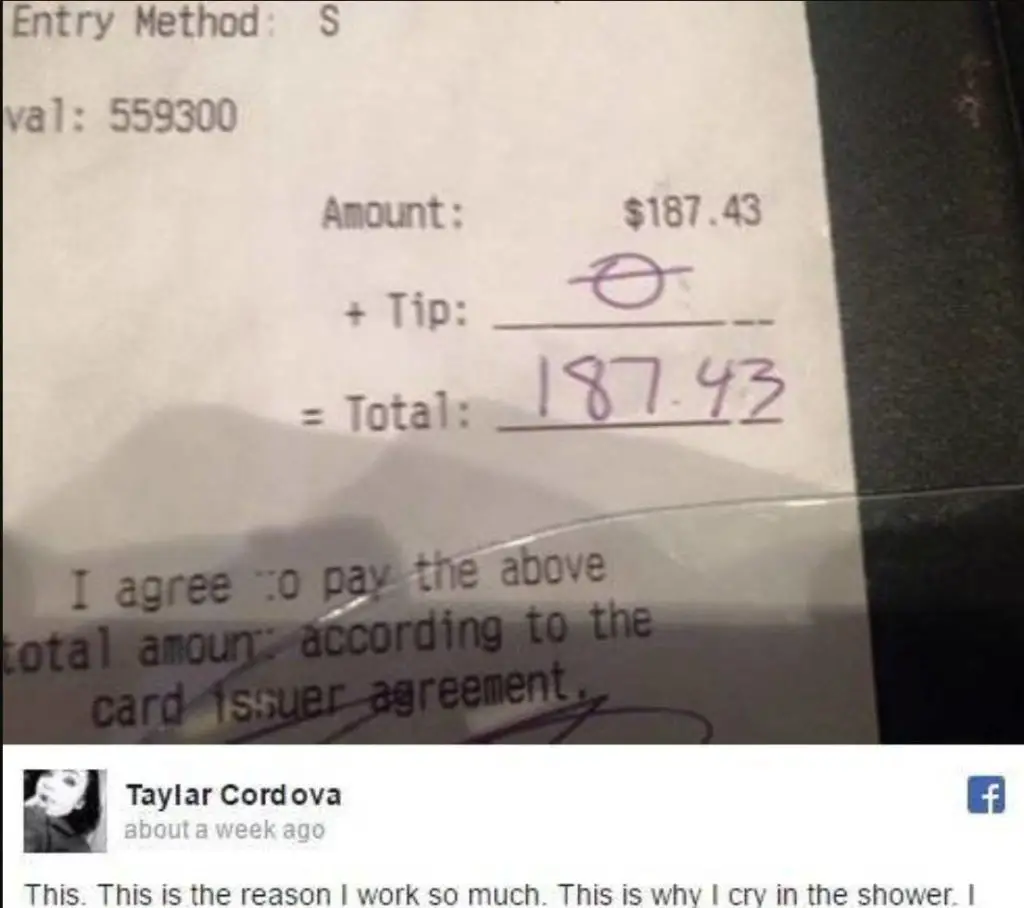
The caption read:
‘“This. This is the reason I work so much. This is why I cry in the shower. I STRUGGLE to put clothes on my daughter’s back and food in our bellies because of THIS. You, are the lowest of the low. Whenever you feel like it’s probably fine to not tip your server, that’s one more bill stacking up because they’re short on money. This is food for the week that our families will go without because you didn’t think it was necessary, even after asking for everything under the sun and receiving it free of charge, mind you. This is one less basic necessity my daughter needs because even TWO more dollars is too much for you.
Every decision has a consequence. Servers are paid a base pay of $2-5/hr depending on the employer, so next time you don’t want to tip, regardless of the situation prior to receiving your bill, think about how much you would have to work that week off $2-5/hr to feed your family, not just you. Could you pay your bills based on that pay alone? Could you feed your family AND yourself? Because that’s what happens when you choose to not tip. Please, please tip your servers. Even if it was the worst service you’ve ever received. A 10% tip is a big enough slap in the face, this completely tore me apart. Don’t even bother walking into a restaurant if you can’t afford to tip. There’s a McDonald’s down the street if you’re that cheap.”
But things may be looking up for servers in the future. According to Eater, “Seven states — including New York — have already increased or eliminated the lower tipped minimum wage and seven more are in the process of increasing or eliminating it altogether.” This change is necessary because, according to the National Restaurant Association, by the end of this year, 12.9 million people will work in the restaurant industry, which will account for 10% of the U.S. workforce.
Note: This article originally appeared on May 16, 2017.
6 histórias de crianças pequenas que expuseram segredos de família por acidente

As crianças são conhecidas por sua honestidade e observações sem filtros, muitas vezes levando a revelações surpreendentes. Mas o que acontece quando elas acidentalmente expõem segredos de família?
As crianças têm um talento especial para dizer as coisas mais estranhas, mas às vezes seus comentários inocentes revelam mais do que os pais esperavam. Essas seis histórias capturam como a honestidade sem filtros dos membros mais jovens da família pode desencadear choque, terror e algumas reuniões familiares memoráveis.
Esqueci de deixar dinheiro para o almoço do meu filho, mas ele disse: “Não se preocupe, mãe. Vou olhar na caixa de cereais onde o pai esconde”
A manhã já tinha ido mal quando coloquei os pés fora de casa.
Quer dizer, eu tinha acordado antes do sol, minha cabeça ainda pesada pela falta de sono. Fazer o turno da manhã como padeiro chefe já era exaustivo o suficiente, mas com meu segundo emprego mais tarde naquele dia, eu mal conseguia me segurar.

Uma mulher em uma padaria | Fonte: Midjourney
Só me dei conta quando estava na metade da modelagem da massa.
Eu tinha esquecido de deixar dinheiro para o almoço do meu filho, Caleb.
Imediatamente limpei a farinha das minhas mãos e peguei meu telefone. Foi quando a tela se iluminou com uma mensagem de Caleb.

Uma mulher assando | Fonte: Midjourney
Mãe, não tem dinheiro para o almoço?
Eu me senti tão mal. Liguei para ele imediatamente para me desculpar pelo meu erro.
“Ei, mãe”, a voz de Caleb era suave. “Eu te mandei mensagem. Não tem dinheiro para o almoço hoje.”
“Caleb, sinto muito, querido”, eu disse. “Eu esqueci completamente.”
“Está tudo bem, mãe!”, ele disse calmamente. “Vou só verificar a caixa de cereal onde o papai guarda dinheiro. Não preciso de muita coisa mesmo.”

Uma mulher chateada em pé na cozinha de uma padaria | Fonte: Midjourney
Eu congelei.
“O quê?”, perguntei.
“Você sabe, a caixa de cereal”, ele repetiu. “Os Cheerios? Papai guarda dinheiro lá. Às vezes dentro da caixa, às vezes embaixo.”
Por um segundo, não soube como responder. Meu marido, escondendo dinheiro? Quase pedi para Caleb explicar, mas não queria abrir uma lata de minhocas. Não quando ele tinha um dia inteiro de escola para passar.

Uma caixa de cereal em uma prateleira | Fonte: Midjourney
“Certo”, eu disse. “Bem, faça isso! E te vejo mais tarde, querida. Te amo!”
“Ok, te amo!” Caleb disse antes de desligar.
Uma caixa de cereal com dinheiro dentro? Na minha despensa? Por quê?
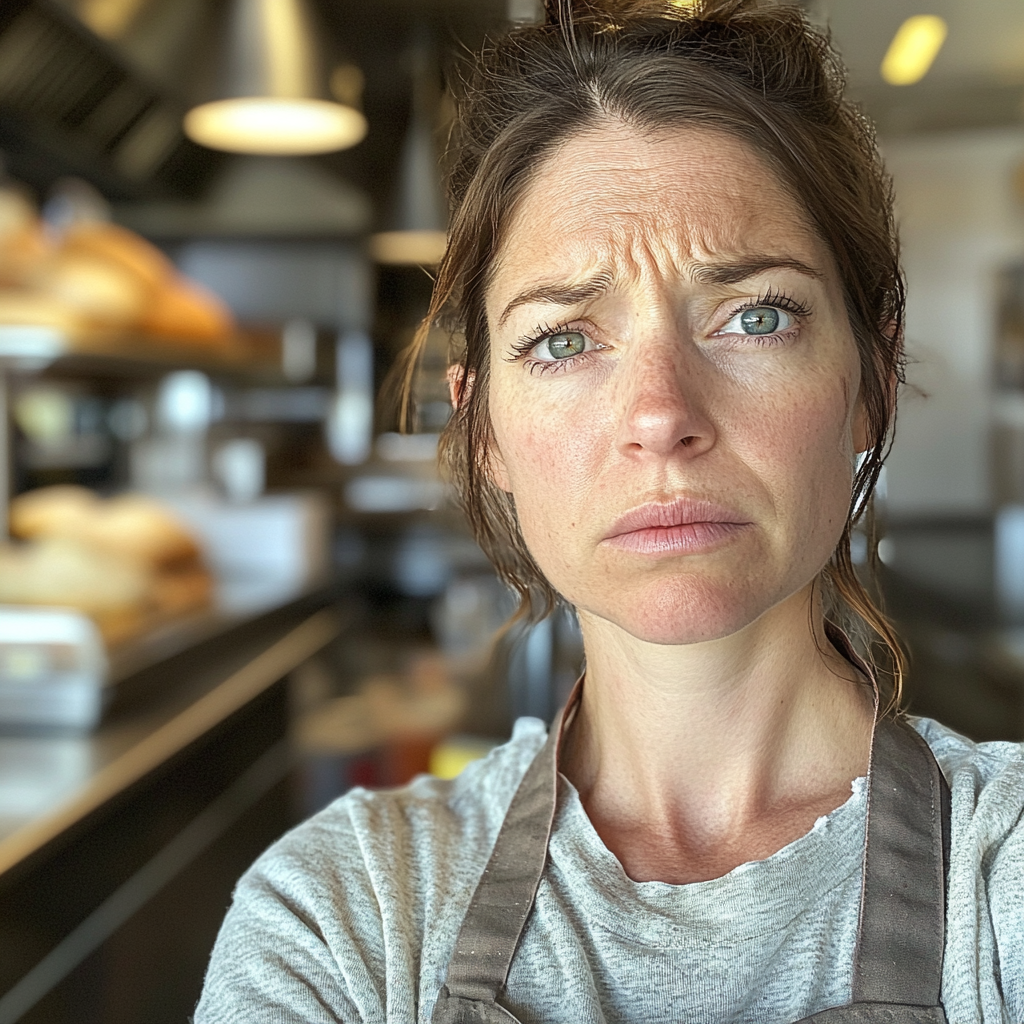
Uma mulher chateada | Fonte: Midjourney
Mal consegui passar o resto do meu turno. Minhas mãos se moviam no piloto automático enquanto eu tirava os pães do forno, mas minha mente estava a mil.
Há quanto tempo Marcus estava escondendo dinheiro? E por quê? Estávamos nos virando, cada dólar contado cuidadosamente. Eu tinha comprado um novo par de tênis para Caleb em uma loja de descontos porque Marcus disse que não tínhamos dinheiro suficiente para gastar.

Um par de tênis | Fonte: Midjourney
Estávamos atrasados nas contas, o carro precisava de reparos e eu estava trabalhando em dois empregos só para nos mantermos à tona. Honestamente, isso estava me matando. Minhas costas doíam mais do que nunca durante a gravidez.
Como Marcus pôde esconder dinheiro desse jeito e não me contar?
Quando finalmente cheguei em casa mais tarde naquela noite, nem me incomodei em tirar os sapatos. Fui direto para a despensa. Com certeza, lá estava. Um envelope, enfiado embaixo da caixa de Cheerios.
Puxei-o para fora com as mãos trêmulas.

Caixas de cereais em uma prateleira | Fonte: Midjourney
Lá dentro havia mais dinheiro do que eu tinha visto em meses. Centenas, talvez mais.
Não era só o fundo de dinheiro do almoço do Caleb para quando eu me esquecesse dele. Não, era o suficiente para cobrir o conserto do nosso carro, o aluguel e provavelmente até algumas das nossas contas.
Olhei para a pilha de dinheiro, tentando processar tudo.

Uma pilha de dólares em uma mesa | Fonte: Midjourney
Marcus estava sentado aqui enquanto eu estava quebrando as costas trabalhando doze horas por dia, achando que estávamos à beira do afogamento.
Eu poderia ter gritado por Marcus, mas eu o ouvi no telefone no escritório. Parecia que ele estava em uma reunião, e eu não queria perturbá-lo.
Em vez disso, tirei alguns pedaços de pescada e joguei alguns brócolis e tomates em uma assadeira. Eu precisava alimentar meu filho.

Uma bandeja de comida | Fonte: Midjourney
O jantar naquela noite foi tenso. Eu mal conseguia olhar para meu marido sem que meu sangue fervesse, mas não o confrontei.
Ainda não.
Eu precisava ver até onde ele levaria isso.
Então, mantive minha voz firme enquanto aproximava o carro.
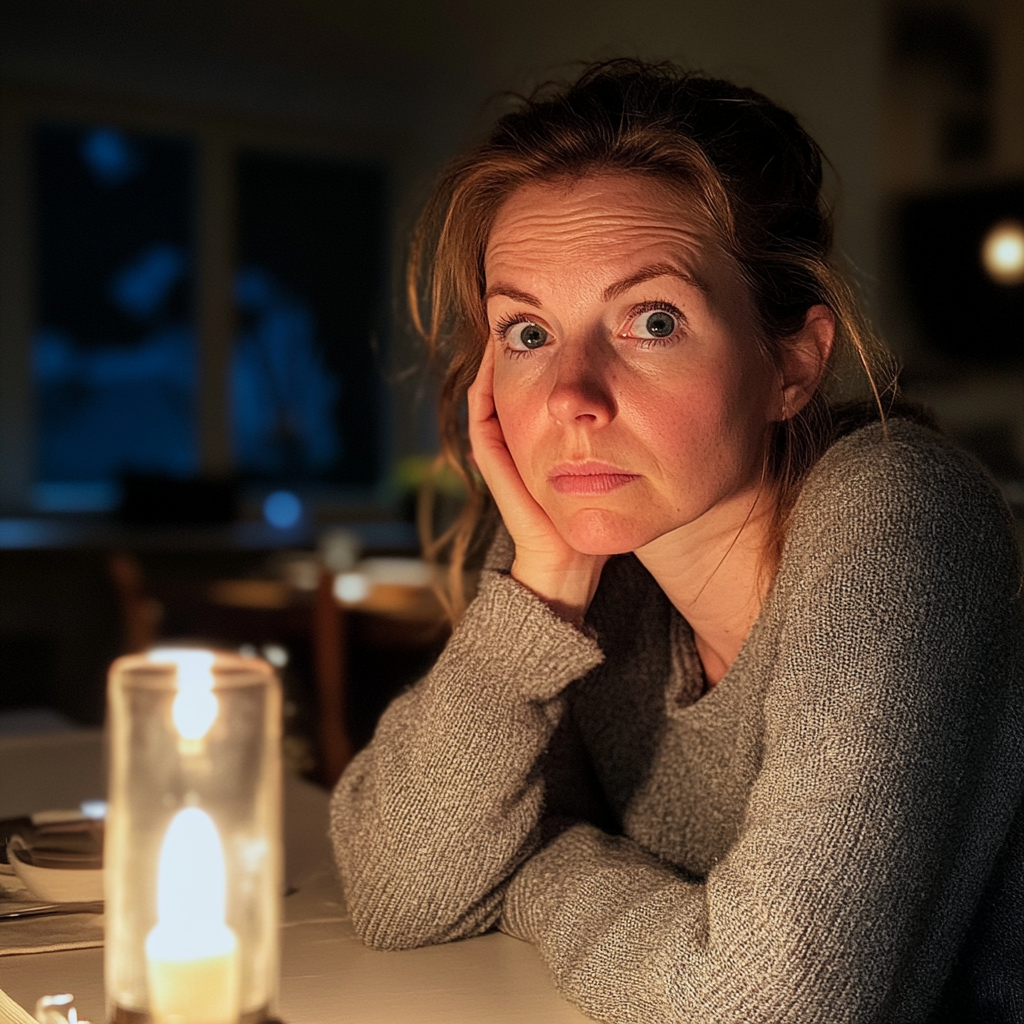
Uma mulher sentada à mesa | Fonte: Midjourney
“Precisamos dar uma olhada na transmissão, Marcus”, eu disse. “Só vai piorar.”
Marcus nem levantou os olhos do prato. Em vez disso, ele derramou molho picante sobre o peixe.
“Teremos que esperar, Jess”, ele disse. “Não temos dinheiro agora.”
Olhei para ele, congelado no ar. Ele disse isso tão facilmente, tão naturalmente, como se o estoque na caixa de cereal não existisse, como se ele realmente acreditasse. Algo dentro de mim estalou.
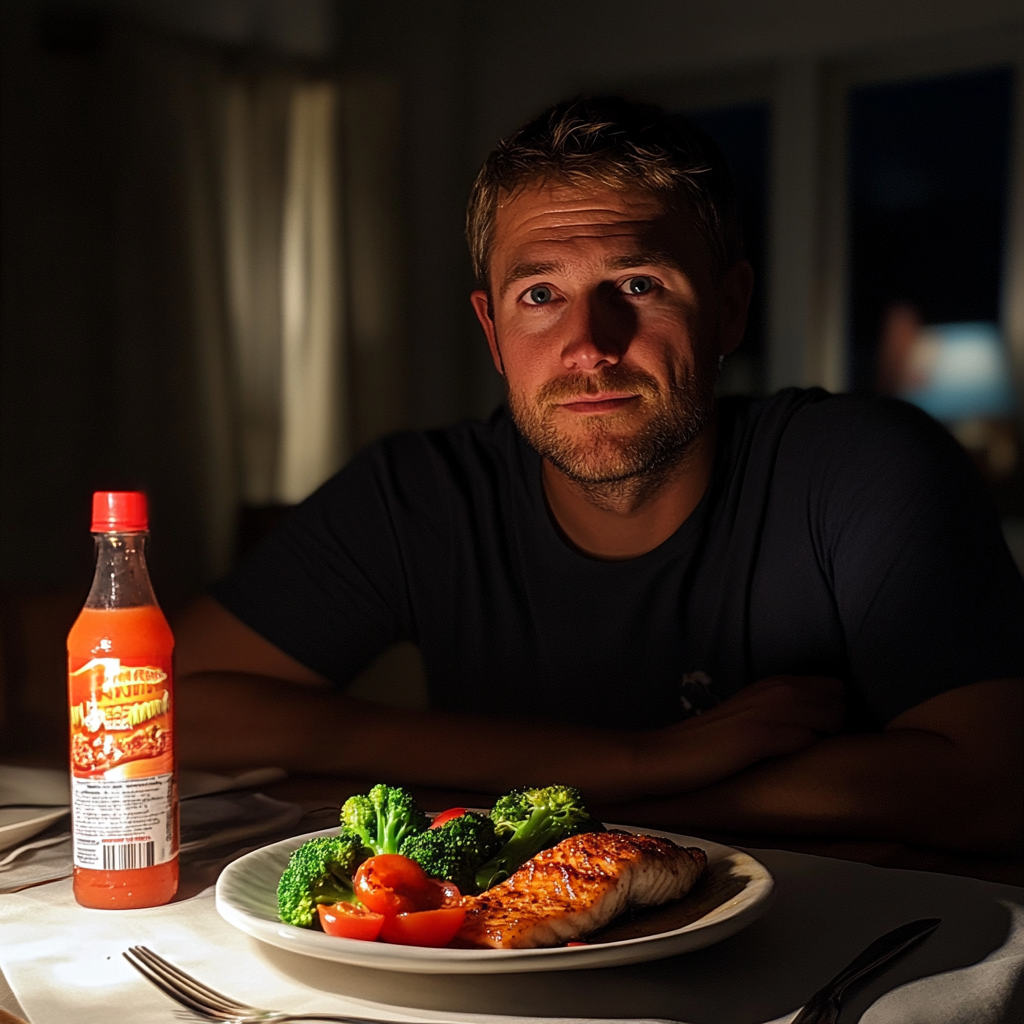
Um homem sentado à mesa | Fonte: Midjourney
Na manhã seguinte, depois do meu turno na padaria, fiz algo que nunca imaginei fazer.
Liguei para um spa de luxo e marquei um horário. Uma transformação completa. Cabelo, unhas, massagem, tudo. Foi imprudente, impulsivo e provavelmente muito irresponsável, mas não me importei.
O dinheiro estava lá e eu iria gastá-lo.

Um spa | Fonte: Midjourney
O dia todo pareceu surreal.
Quando cheguei em casa, mal me reconheci.
Meu cabelo estava penteado em ondas suaves, e minhas unhas estavam pintadas de um vermelho profundo e rico. Eu parecia alguém que tinha tudo sob controle, alguém que não estava lutando para sobreviver a cada dia.

Uma mulher sorridente | Fonte: Midjourney
Quando Marcus entrou pela porta, ele olhou para mim com os olhos arregalados.
“O que você fez?” ele perguntou.
“Achei o dinheiro na caixa de cereal”, eu disse. “Eu merecia um dia para mim.”

Um homem chocado sentado em um sofá | Fonte: Midjourney
“Você não deveria ter gasto isso!” ele gritou. “Não era para isso.”
“Então para que foi, Marcus?”, exigi. “Porque eu estava trabalhando até a morte, achando que mal estávamos conseguindo sobreviver, enquanto você estava acumulando algum tipo de estoque secreto do qual eu não tinha ideia.”

Um close de uma mulher | Fonte: Midjourney
“Jess, eu não estava tentando esconder isso de você. Eu só… eu não queria que você se preocupasse.”
“Preocupar-se com o quê?”
Ele afundou em uma cadeira e esfregou o rosto.
“Meu chefe… ele deu a entender que pode haver demissões em breve. Eu queria ter algo reservado, só por precaução. Eu não queria falar sobre algo que talvez nem acontecesse.”

Um homem carrancudo sentado em um sofá | Fonte: Midjourney
“Então, você mentiu para mim?”
“Eu não menti”, ele disse. “Eu só não te contei.”
“Nós deveríamos ser abertos e honestos, Marcus”, eu disse. “Você deveria ter confiado em mim o suficiente para me dizer a verdade.”
“Você está certo”, ele disse. “Sinto muito.”
“Você ao menos percebe como isso parece? Estou trabalhando duro achando que estamos quebrados enquanto você está escondendo dinheiro para algum hipotético desastre futuro? Como você pôde não me contar?”

Uma mulher parada em uma sala com pouca luz | Fonte: Midjourney
“Eu não queria piorar as coisas”, ele disse, balançando a cabeça. “Achei que guardar para mim seria mais fácil.”
“E se você perdesse seu emprego amanhã, hein? Você estava planejando sacar seu estoque secreto e dizer, ‘Ah, ei, a propósito, eu estava guardando isso o tempo todo’?”
“Não… quero dizer, sim. Eu só queria te proteger.”
“Você não me protege me mantendo no escuro, Marcus.”
Não tinha certeza se ele entendia como tudo isso me fazia sentir.

Um homem frustrado | Fonte: Midjourney
“Somos um time, Marcus. Ou não somos?”, perguntei.
“Estamos, Jess”, ele disse. “Eu prometo que estamos.”
Ficamos ali por um momento, e lentamente, comecei a me acalmar. Marcus tinha errado, e eu podia ver que ele realmente não tinha a intenção de me machucar. Mas ele fez. Eu estava machucada.

Uma mulher olhando pela janela | Fonte: Midjourney
Tivemos um longo caminho a percorrer antes que eu finalmente começasse a confiar nele novamente.
Minha filha de 5 anos quer convidar “a senhora que visita o pai enquanto a mãe está no trabalho” para sua festa de aniversário
Meu marido, Jake, e eu estamos juntos há dez anos, casados há sete. Ele é um cara ótimo — gentil, trabalhador e um pouco desmiolado, mas nunca tive motivos para duvidar dele até recentemente.

Uma família feliz | Fonte: Midjourney
No começo deste ano, Jake perdeu o emprego. Enquanto ele estava procurando emprego, eu estava trabalhando longas horas em tempo integral para manter as coisas funcionando bem. Tem sido difícil, mas fizemos dar certo. Nossa filha de cinco anos, Ellie, adora passar mais tempo com ele.
Para ela, Jake é seu herói.
A vida parecia normal… até a semana passada.
O aniversário de Ellie estava chegando, e estávamos em modo de planejamento total. Quando me sentei com ela uma noite para terminar a lista de convidados, ela me pegou completamente desprevenido.

Uma mulher trabalhando em uma lista de convidados | Fonte: Midjourney
Pedi que ela me dissesse quem mais ela queria convidar além de seus amigos e familiares.
“Mamãe, posso convidar a moça bonita que vem visitar o papai enquanto você está no trabalho?” ela perguntou.
Eu congelei no meio do meu gole de café, tentando ficar calma. “A moça bonita que visita o papai? Que moça, querida?”
Ellie sorriu, completamente alheia à tempestade que se formava em meu peito.
“É, aquela de cabelo longo! Ela é tão legal! Ela diz que o papai é gentil, e ela sempre dá um grande abraço nele quando vai embora. Ela pode vir? Por favor?”
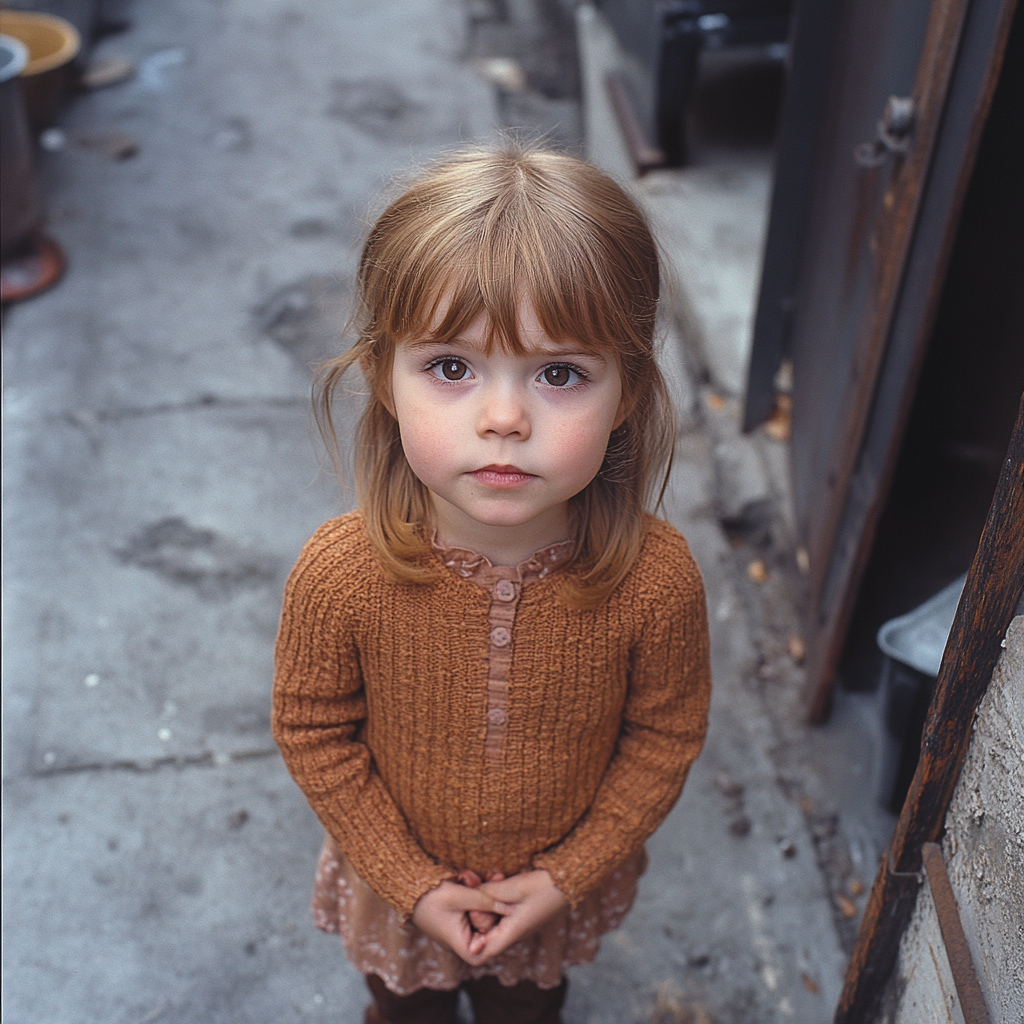
Uma menina pedindo esmola | Fonte: Midjourney
“Claro, querida”, fingi um sorriso. “Por que você não a convida da próxima vez que ela estiver aqui?”
“Ok! Eu vou!” Ellie comemorou. “Obrigada, mamãe!”
Naquela noite, mal dormi. Minha mente girava com perguntas, dúvidas e um crescente mal-estar. Jake nunca me dera um motivo para duvidar dele antes, mas o comentário inocente de Ellie plantou sementes de suspeita. Quem era essa “moça bonita”? Uma amiga? Uma vizinha? Ou pior, alguém de quem eu nunca tinha ouvido falar?

Uma mulher preocupada e sem dormir | Fonte: Midjourney
Também contemplei que meu filho de cinco anos poderia estar imaginando coisas, embora isso parecesse um pouco extremo para ter sido inventado. Decidi não confrontar meu marido porque queria convidar o estranho para a festa e ver como as coisas iriam se desenrolar.
Na noite seguinte, perguntei a Ellie se ela havia convidado a “moça bonita” para sua festa e ela me disse que sim.

Uma mulher conversando com sua filha | Fonte: Midjourney
O dia da festa chegou, e eu estava uma pilha de nervos. A festa começou como qualquer outra, com amigos e familiares enchendo nossa sala de estar, crianças correndo com balões e Ellie nas nuvens.
Uma hora depois do início da festa, a campainha tocou. Meu estômago embrulhou. Jake estava no quintal ajudando Ellie com seu bolo, então fui atender. De pé na varanda estava uma jovem mulher, talvez com vinte e poucos anos.
Ela tinha cabelos longos e escuros, um sorriso tímido e segurava uma pequena sacola de presente nas mãos.
“Oi, eu sou Lila”, ela disse suavemente. “Estou aqui para a festa da Ellie.”
Ellie veio correndo para a porta naquele exato momento, seu rosto se iluminando.
“É ela! Mamãe, é ela! A amiga do papai!”

Uma menina animada olhando para alguém | Fonte: Midjourney
Fiquei paralisado, tentando entender o que estava vendo, mas consegui gaguejar: “Oh! Uh… por favor, entre.”
Ellie agarrou a mão da mulher e a puxou para dentro. Ela arrastou Lila até Jake, que ficou pálido no segundo em que a viu. Ele abriu a boca, fechou-a e então suspirou como um homem caminhando para sua perdição.
“Lila”, ele disse. “Eu não… eu não achei que você realmente viria.”
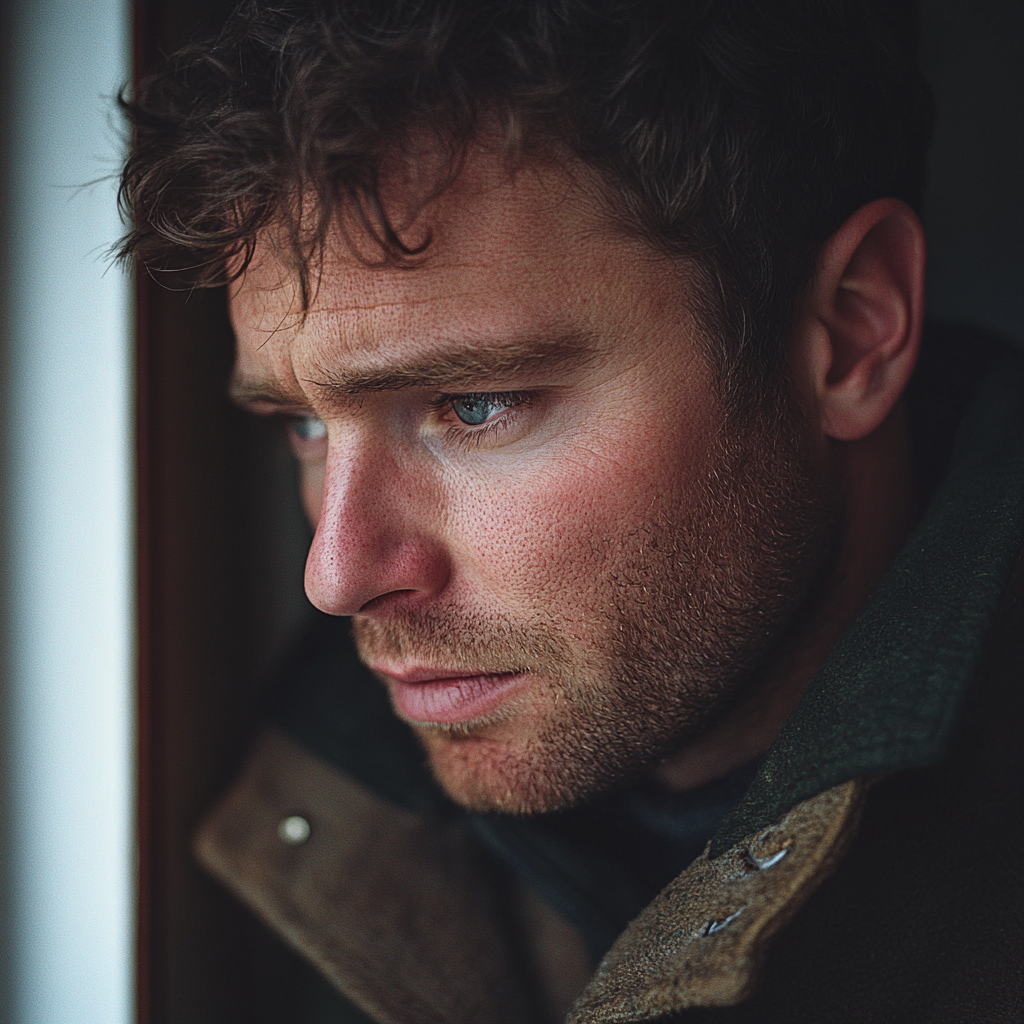
Um homem envergonhado | Fonte: Midjourney
“Precisamos conversar”, interrompi. Jake assentiu e levou Lila e eu para a cozinha.
A tensão no ar era intensa enquanto Lila mexia nervosamente na sacola de presentes.
“Eu não queria causar problemas”, ela começou. “Eu só pensei que seria legal conhecer todo mundo, e Ellie me convidou.”
“Quem é você exatamente?”, perguntei.
Lila olhou para Jake, que parecia querer desaparecer. “Eu sou… filha do Jake.”
As palavras me atingiram como um trem de carga. “O quê?”

Uma mulher chocada | Fonte: Midjourney
Lila tentou explicar tudo enquanto meu marido parecia ter visto um fantasma. Demorou um tempo para ele finalmente falar.
“Lila é minha filha de antes de eu te conhecer”, ele disse. “Eu não sabia sobre ela até alguns meses atrás. A mãe dela nunca me contou ou a ela. Antes de falecer no começo deste ano, ela contou a Lila sobre mim, e ela me rastreou e me encontrou. Ela se apresentou enquanto você estava no trabalho.”
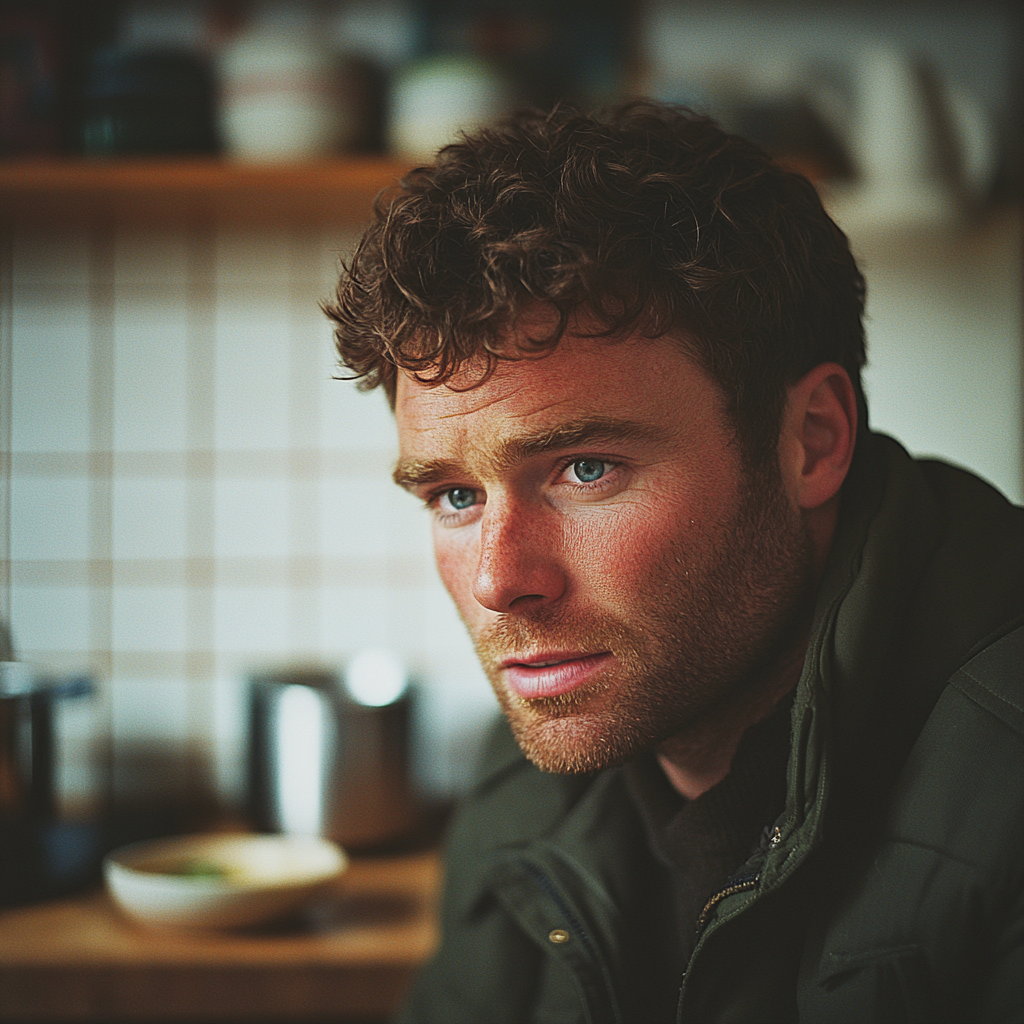
Um homem envergonhado falando | Fonte: Midjourney
“Quando ela me disse quem era, eu não acreditei de início”, Jake admitiu, parecendo envergonhado. “Quer dizer, surgiu do nada. Então eu… eu pedi a ela um teste de DNA.”
Lila assentiu e me mostrou uma cópia dos papéis de paternidade por e-mail.
“Eu entendi a necessidade dele de provas. Não foi fácil ouvir, mas eu trouxe um teste quando voltei na próxima vez, e é verdade, ele é meu pai”, ela respondeu.
Examinei o documento, minhas mãos tremendo. Era inegável.
Olhei para ele, atordoada. “E você não pensou em me contar?”

Uma mulher chocada segurando um telefone | Fonte: Midjourney
“Eu não sabia como”, ele admitiu. “Eu ainda estava processando isso sozinho. Eu não queria jogar isso em você até ter certeza… ou pelo menos pensar nas coisas.”
“Ok”, eu disse, tentando estabilizar minha respiração. “Mas por que Ellie sabe sobre ela?”
“Lila esteve visitando enquanto você estava no trabalho”, ele explicou. “Ela queria conhecer a família, e Ellie… bem, ela ama todo mundo.”

Um homem falando | Fonte: Midjourney
“Então seu plano era simplesmente… não me contar? Deixar uma criança de cinco anos fazer isso por você?” Eu perguntei.
“Eu sei. Eu errei”, Jake admitiu. “Eu só não queria tornar as coisas mais difíceis para você.”
Lila deu um passo à frente, com olhos suplicantes.
“Sinto muito mesmo. Nunca quis causar problemas. Só queria conhecer meu pai e sua família. Sua filha é uma criança tão doce. Ela até me mostrou seus desenhos.”
“Está tudo bem, Lila. Você pode ir se juntar à festa. Jake e eu vamos encerrar as coisas.”

Uma mulher em uma festa de aniversário | Fonte: Midjourney
Suspirei, sobrecarregada, mas começando a ver o quadro geral. Lila não era uma “outra mulher”. Ela era uma jovem mulher em busca de família após perder a mãe. E Jake, com todas as suas falhas, estava apenas tentando navegar em uma situação que ele nunca havia previsto.
Depois que ela saiu da cozinha, Jake se desculpou profusamente e repetidamente por esconder isso de mim, prometendo ser mais aberto no futuro.
Quando finalmente voltamos para a festa, Ellie estava sentada com Lila, segurando sua mão e contando suas histórias.
“Eu sei que não foi assim que você imaginou que hoje seria”, Jake disse enquanto colocava a mão no meu ombro. “Mas espero que possamos descobrir isso juntos.”

Um homem fazendo um voto | Fonte: Midjourney
Eu assenti. “Nós vamos. Mas chega de segredos, Jake.”
“Nunca mais”, ele prometeu.
Nas semanas que se seguiram, começamos a nos ajustar à nossa nova realidade. Lila, que tinha acabado de começar a faculdade em nossa cidade, tornou-se uma visitante regular. Ellie a adorava e, lentamente, eu também.
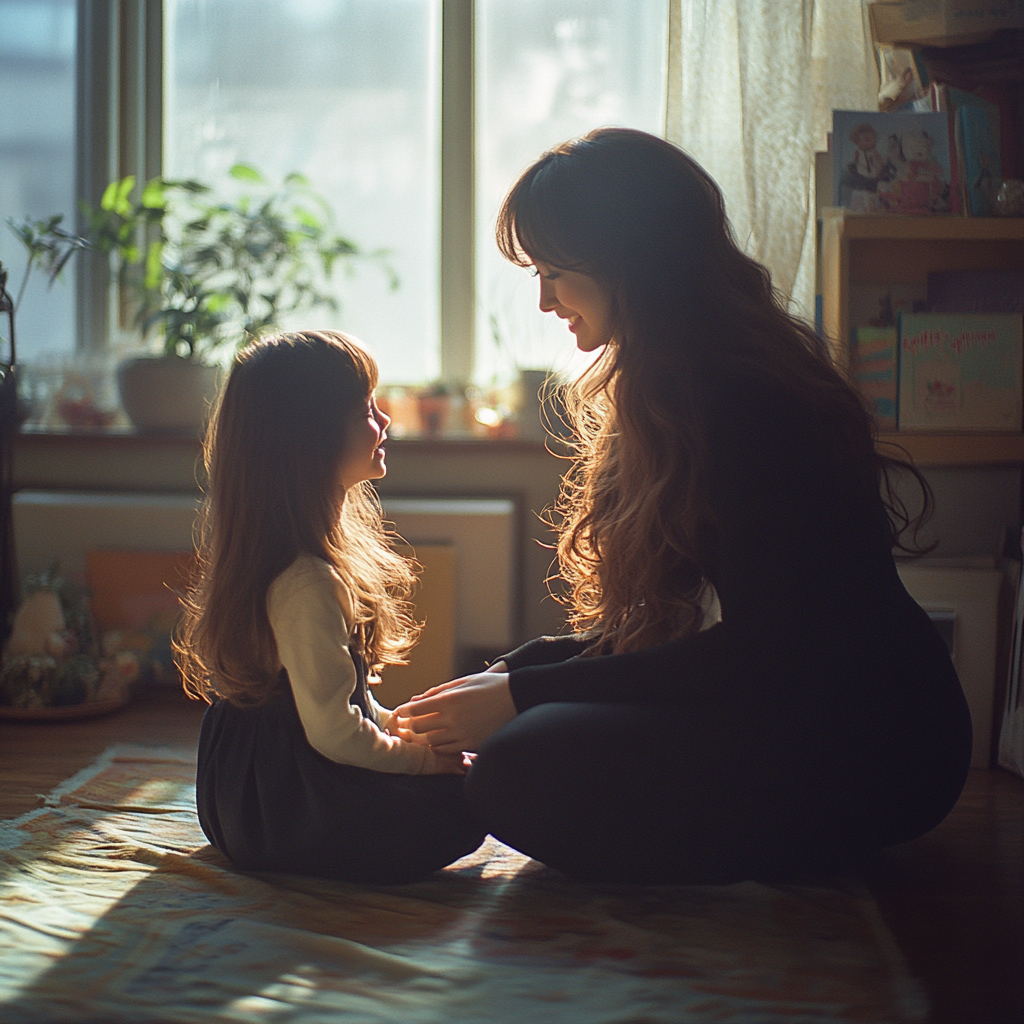
Uma mulher feliz brincando com uma menina | Fonte: Midjourney
Não foi fácil, mas eu pude ver o quanto Lila queria fazer parte de nossas vidas. Espero que as coisas se encaixem com o tempo.
Nossa filha adotiva faleceu – Uma semana depois, meu filho de 5 anos disse: ‘Minha irmã acena boa noite daquela casa’
Nunca pensei que escreveria isso, mas minha vida se desfez de uma forma que eu nunca poderia ter imaginado.
Cinco anos atrás, eu era o mais feliz que já tinha sido.

Uma mulher sorridente | Fonte: Midjourney
Meu marido, Matt, e eu passamos anos tentando ter um filho, suportando consultas médicas intermináveis, exames invasivos e desgosto. Quando os médicos nos disseram que era improvável que eu pudesse conceber, fiquei arrasada.
Mas Matt me segurou durante todo esse tempo, prometendo que construiríamos uma família de outra maneira.
Foi assim que Emily entrou em nossas vidas.

Uma menina sorridente | Fonte: Midjourney
Ela tinha sete anos, olhos grandes e esperançosos e um sorriso hesitante que derreteu meu coração. Desde o momento em que a trouxemos para casa, nossa casa pareceu brilhar com uma nova energia.
Pela primeira vez em anos, me senti completo.
E então, o impensável aconteceu: engravidei.

Uma mulher grávida | Fonte: Midjourney
Parecia um sonho. Nosso filho, Ben, nasceu um ano depois. O milagre do seu nascimento acrescentou outra camada de alegria ao nosso lar.
E Emily? Ela amava ser uma irmã mais velha.
Ela segurava a mãozinha de Ben, lia para ele e lhe ensinava canções bobas. Por cinco anos, nossa casa foi cheia de risadas, histórias de ninar e o lindo caos da vida familiar.
Mas então, cinco anos depois, o acidente aconteceu.
Emily estava voltando da escola para casa quando aconteceu. Eu não estava lá, mas Matt me ligou e disse que ela tinha sido atropelada por um carro.

Uma menina caminhando em uma estrada | Fonte: Midjourney
“Ally”, ele disse, com a voz trêmula. “Ela se foi. Em se foi!”
“O que você quer dizer com sumiu? Você não consegue encontrá-la?”, perguntei enquanto o pânico se instalava rapidamente.
“Querida, não”, ele disse. “Ela se foi. Morreu. Ela foi atropelada por um carro enquanto atravessava a rua para voltar para casa… Ally, ela se foi. Nossa garotinha…”
“Onde você está?”, perguntei. “Eu vou.”

Uma mulher chocada ao telefone | Fonte: Midjourney
“Não”, ele disse. “Não venha. Estou no hospital. Te encontro em casa… a babá está esperando por você com Ben.”
Tudo depois disso foi um borrão. Caí em uma depressão profunda.
Eu nem a vi uma última vez; Matt tinha providenciado a cremação enquanto eu estava em meu luto. Eu não conseguia nem ficar bravo.
Uma noite, cerca de duas semanas depois, Ben se aproximou de mim hesitante. Ele tinha cinco anos e estava inquieto, e lutava para dormir sem Emily. Mas naquela noite, sua pequena voz rompeu a névoa da minha tristeza.
“Mamãe”, ele sussurrou. “Você sabe, minha irmã acena para mim à noite daquela casa ao lado.”

Um garotinho em um corredor | Fonte: Midjourney
Meu coração se contorceu dolorosamente. Ele deve ter imaginado coisas que somente uma criança desesperada para ver sua irmã novamente esperaria.
Mas a certeza em seus olhos me fez parar.
“Que tal eu ler uma história extra para você hoje à noite?”, perguntei a Ben.
Por volta das 21h, ele se deitou na cama e apontou para a janela.
“Olha, mamãe”, ele disse suavemente.
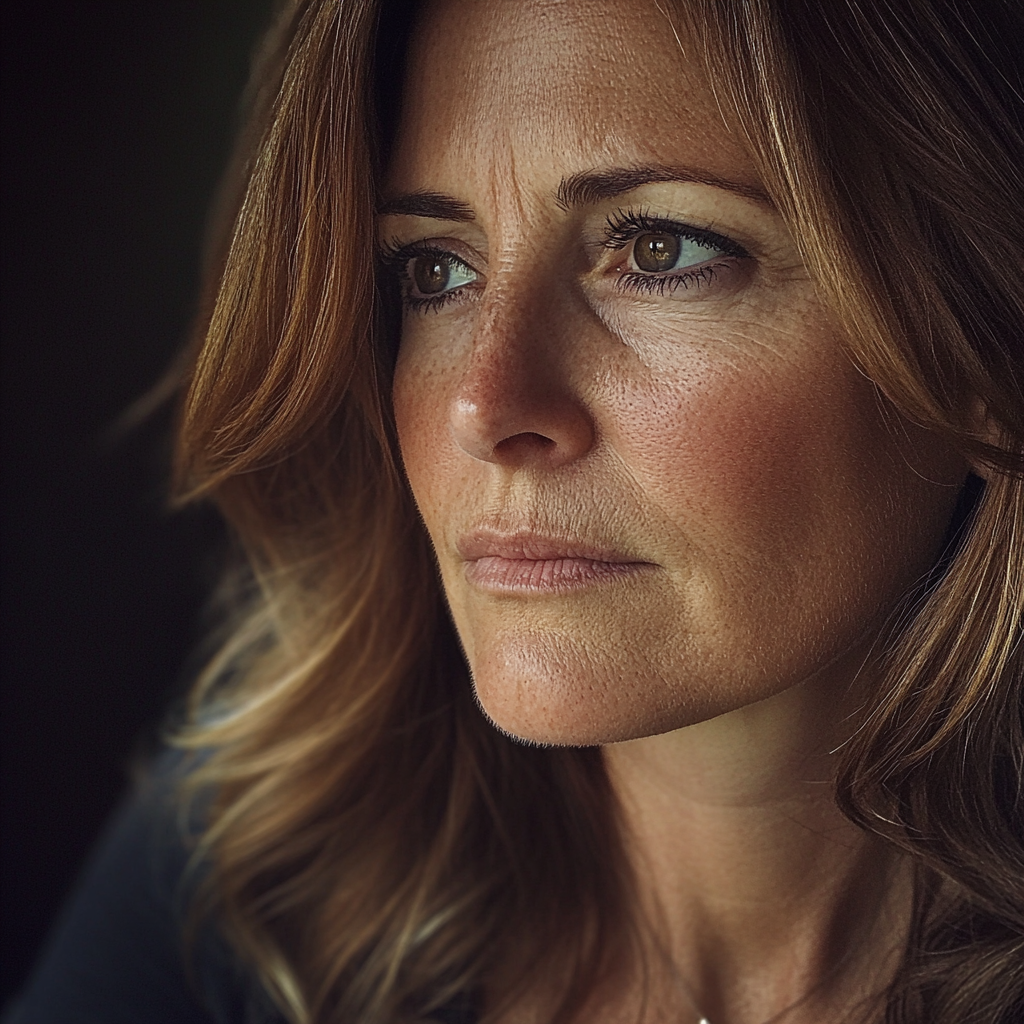
Um close de uma mulher | Fonte: Midjourney
Minha respiração ficou presa na garganta. Lá, do outro lado da rua, na janela do andar de cima da casa que sempre pareceu vazia, uma pequena sombra estava parada.
Era a Emily.
Seus longos cabelos caíam sobre os ombros, e seu aceno familiar, o mesmo aceno que eu costumava ver todas as manhãs quando ela saía para a escola, me deu um arrepio na espinha.
Pisquei, certo de que estava alucinando, mas ela não desapareceu. Ela apenas ficou ali, olhando para nossa casa.
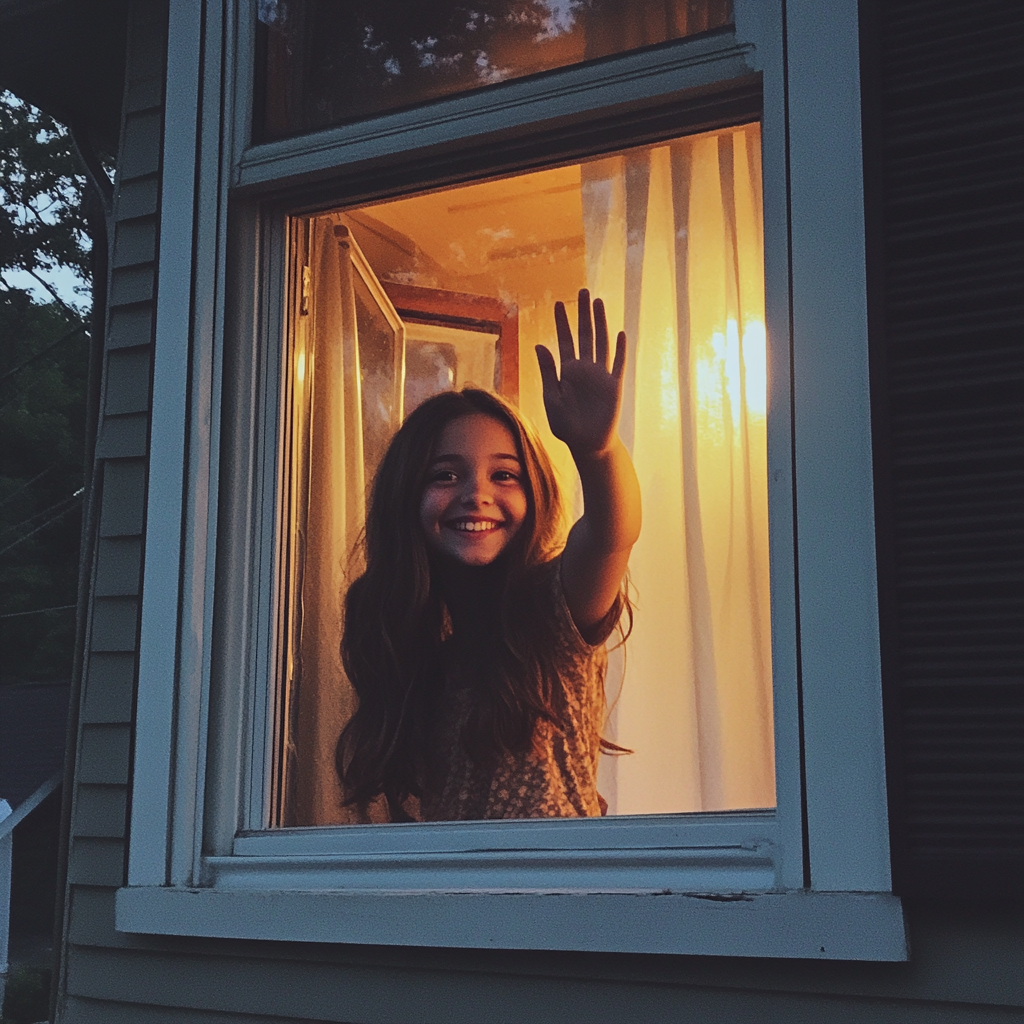
Uma menina acenando | Fonte: Midjourney
O pânico inundou minhas veias. Beijei a testa de Ben e sussurrei que voltaria logo.
“Papai está no nosso quarto, querida”, eu disse. “Acorde-o se precisar dele.”
Coloquei meu casaco, corri escada abaixo e irrompi no ar frio da noite. Meus pés descalços batiam no pavimento enquanto eu atravessava a rua em direção à casa.
Bati na porta.
Logo, uma mulher alta e elegante abriu a porta. Ela tinha feições polidas, o tipo de beleza que falava de riqueza e status.

Uma mulher parada na porta | Fonte: Midjourney
“Posso ajudar?”, ela perguntou, seu tom curto e irritado. “É bem tarde.”
“Eu vi minha filha na sua janela”, eu disse, minha voz tremendo. “Por favor, deixe-me vê-la! Emily é minha filha. Ela… ela morreu. E eu sei que isso é impossível, mas eu sei o que vi.”
Antes que a mulher pudesse responder, ouvi passos descendo as escadas.
E então Emily apareceu.
“Mãe!” ela gritou, correndo em minha direção.
Abri meus braços, pronto para pegá-la, mas então tudo se despedaçou.

Uma menina numa escada | Fonte: Midjourney
Matt entrou no corredor.
Fiquei congelado, meu cérebro se recusando a processar o que eu estava vendo.
“O que é isso??” Eu exigi. “O que está acontecendo? Você estava na cama!”
A verdade foi revelada em fragmentos, cada pedaço mais horripilante que o anterior.
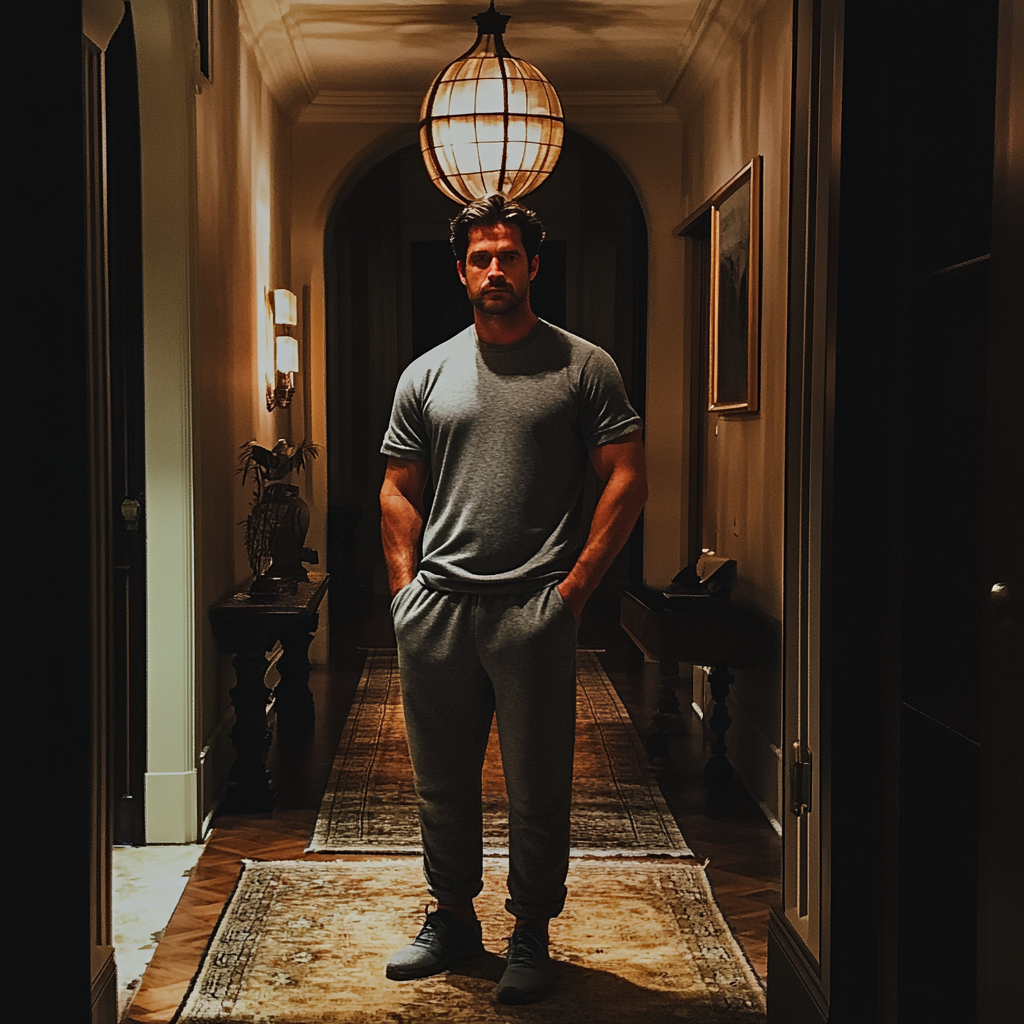
Um homem parado em um corredor | Fonte: Midjourney
A mulher era Robin, a mãe biológica de Emily. Um mês atrás, ela contatou Matt, dizendo que queria sua filha de volta. Ela havia se casado com um homem rico e, agora que tinha os recursos e a estabilidade, sentia-se pronta para criar Emily.
“Mas como o orfanato deu nossos detalhes? Isso é confidencial!” Eu chorei.
“É incrível como as portas simplesmente se abrem quando você tem dinheiro, Ally”, disse Matt.

Uma mulher em sua mesa | Fonte: Midjourney
“Eu não queria uma batalha pela custódia”, disse Robin. “Uma briga judicial seria longa, cara e prejudicial à minha imagem. Não espero que você entenda.”
Em vez disso, ela ofereceu a Matt uma quantia obscena de dinheiro, o suficiente para garantir o futuro de Ben e tornar nossas vidas muito mais fáceis. E Matt concordou.
“Eu pensei que não poderíamos ter filhos”, ele gaguejou. “Essa é a única razão pela qual concordei com a adoção em primeiro lugar. Mas então Ben nasceu, e tudo mudou. Ele tem sido meu foco, Ally. Eu amo Emily, mas Ben é… O futuro de Ben foi o preço que escolhi pagar.”

Um homem com a mão na cabeça | Fonte: Midjourney
A explicação saiu de repente. Matt e a mulher tinham encenado o “acidente” para me devastar e garantir que eu não lutaria. Eu me senti doente. Eu me senti traído. Eu me senti perturbado.
Acontece que a casa do outro lado da rua era um arranjo temporário para facilitar a vida de Emily em sua nova vida. Eles a alimentaram com mentiras, dizendo que eu não a queria mais, que eu tinha escolhido Ben em vez dela.

Uma mulher chocada | Fonte: Midjourney
Os gritos de Emily enchiam o ar enquanto ela se agarrava a mim, soluçando.
“Por que você não me queria mais, mamãe?” ela lamentou. “Você não me amava mais?”
Meu coração se despedaçou.

Uma menina chateada | Fonte: Midjourney
Segurei minha garota com força, prometendo a ela repetidamente que eu a amava e nunca tinha parado de amá-la. Lágrimas escorriam pelo meu rosto enquanto eu olhava para Matt, minha raiva borbulhando.
“Você fez isso!” Eu sibilei. “Você a traiu. Você me traiu!”
Então, agarrei a mão de Emily e corri para casa com ela. Levantei Ben e os coloquei no carro. Eu precisava tirar meus filhos daquele bairro.

Uma mulher dirigindo seu carro à noite | Fonte: Midjourney
A batalha legal que se seguiu foi brutal. As mentiras que Matt e Robin tinham contado se desfizeram rapidamente, especialmente com o testemunho de Emily e as evidências que apresentei.
No final, ganhei a custódia total de Emily e Ben. Matt assinou os papéis do divórcio, e a mãe biológica foi embora sem buscar a custódia porque o marido achou que não “valia a pena”.

Uma mulher e seus filhos | Fonte: Midjourney
Minha filha ainda tem pesadelos sobre aquela época, mas estamos nos curando juntas. Toda noite, coloco meus filhos na cama, grata por eles estarem seguros e serem meus.
Minha filha de 7 anos fez um desenho do meu marido com outra mulher e escreveu: “Mal posso esperar para que você seja minha mãe”
Não pensei que estaria aqui… mas essa tem sido a vida ultimamente.

Uma mulher olhando pela janela | Fonte: Midjourney
Eu sou Amber, tenho trinta e quatro anos, sou casada com meu marido Jack há dez anos e sou mãe da minha alegria, Mia, uma garotinha de sete anos. Ultimamente, tenho estado mais ocupada do que nunca em toda a minha vida, o que realmente diz alguma coisa, porque sou uma advogada corporativa.
A saúde da minha mãe vem piorando no último ano, e estamos nos dedicando a cuidar dela.

Uma mulher sentada em uma cama de hospital | Fonte: Midjourney
Durante esse tempo, Jack foi o melhor parceiro e rocha que eu poderia ter pedido. Ele se destacou em casa de maneiras que eu nunca imaginei ou esperava.
Ele cozinha, limpa e ajuda Mia com o dever de casa enquanto eu cuido da mamãe.

Uma dupla de pai e filha sentados em um sofá | Fonte: Midjourney
Alguns dias atrás, cheguei tarde em casa, exausta, faminta e pronta para desmaiar. Depois de jantar às pressas enquanto Mia tomava banho, coloquei minha garotinha para dormir.
Depois que ela dormiu, comecei a arrumar seus lápis de cera e livros de colorir espalhados por todo o carpete. Foi quando meu olhar pousou em um desenho.
À primeira vista, parecia inocente o suficiente. Um esboço de uma família feliz feito por uma criança. Um homem, uma mulher e uma garotinha de mãos dadas. Mas quando olhei mais de perto, meu estômago se revirou.
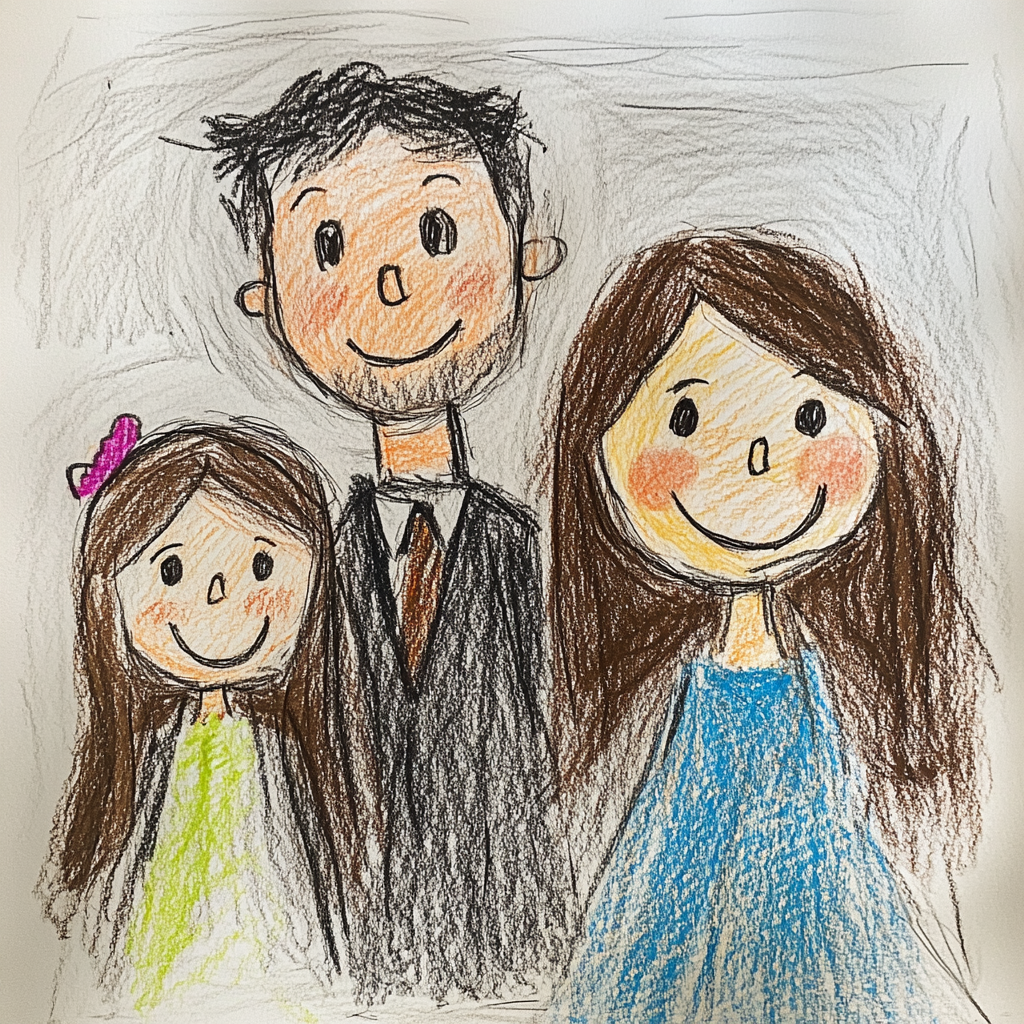
Desenho de uma criança | Fonte: Midjourney
O homem era inconfundivelmente Jack. A garotinha era claramente Mia. Mas a mulher? Definitivamente não eu.
Ela tinha longos cabelos castanhos e usava um vestido de noiva esvoaçante. Abaixo do desenho, na letra miúda de Mia, estavam as palavras que partiram meu coração:
Mal posso esperar para que você seja minha mãe!
Levei a foto para a cama de Mia e sentei na beirada, tentando acordá-la o suficiente para obter respostas.
“Querida, você pode me falar sobre esse desenho?” Perguntei calmamente.
“Que desenho, mamãe?”, ela perguntou, esfregando os olhos para afastar o sono.
Quando Mia olhou para o desenho, seus olhos se arregalaram e ela arrancou o papel da minha mão.

Uma menina chateada | Fonte: Midjourney
“Você não deveria ter encontrado isso! Papai disse para esconder melhor!” ela deixou escapar.
Esconder melhor?
Meu coração começou a bater forte. O que estava acontecendo? Jack estava traindo? E pior… Mia já estava imaginando essa outra mulher como sua mãe?
Mal dormi naquela noite enquanto pensava em todos os piores cenários.

Uma mulher chateada sentada em um sofá | Fonte: Midjourney
Na manhã seguinte, confrontei Jack depois que Mia saiu para a escola.
“O que é isso?”, perguntei, colocando o desenho em suas mãos.
Seus olhos se arregalaram e seu rosto ficou pálido.
“Você disse a ela para esconder?”, perguntei. “Você realmente disse à Mia para esconder?”
“Espera, espera,” ele gaguejou, erguendo as mãos defensivamente. “Não é o que você pensa, Amber. Deixe-me explicar tudo para você.”

Um homem preocupado em pé na cozinha | Fonte: Midjourney
“Você tem exatamente cinco segundos, Jack. Fiquei louco a noite toda.”
Meu marido passou a mão pelos cabelos, claramente angustiado.
“Venha comigo”, ele disse.
“O quê? Para onde estamos indo?” Eu perguntei.

Um homem de pé em uma cozinha com a cabeça baixa | Fonte: Midjourney
“Estamos indo para a escola da Mia. Preciso te mostrar uma coisa”, ele disse.
Quando chegamos na escola, Jack foi até a recepção e pediu para ver a professora de Mia, Clara.
Assim que Clara entrou, senti como se tivesse levado um soco no estômago. Ela era deslumbrante, e pela minha vida, não conseguia lembrar por que não a tinha conhecido antes. Ela tinha cabelos castanhos longos, um sorriso brilhante e um comportamento alegre sem esforço.
Ela tinha que ser a mulher do desenho de Mia. Era inconfundível.

Uma mulher sorridente | Fonte: Midjourney
“Clara”, disse Jack. “Você pode explicar para minha esposa o que está acontecendo com Mia?”
A expressão de Clara mudou para confusão, mas depois se suavizou quando ela olhou para mim.
“Ah, claro”, ela disse.

Uma mulher estressada | Fonte: Midjourney
Ela gesticulou para que nos sentássemos na pequena sala ao lado da recepção.
“Olha, Mia tem passado por momentos difíceis ultimamente”, ela começou. “Ela mencionou que sente que sua mãe não tem mais tempo para ela. Eu tentei tranquilizá-la, mas ela… bem, olha, ela tem sete anos. E ela tem desenhado muitas imagens para processar seus sentimentos.”
Clara me entregou uma pilha de desenhos e meu coração apertou enquanto eu os folheava.

Uma pilha de desenhos infantis e livros de colorir | Fonte: Midjourney
A maioria eram variações do mesmo tema: uma família feliz com Clara no meu lugar. No verso de um dos desenhos, havia mais palavras que eu não tinha notado da primeira vez:
Papai e Clara.
“Então, você tem passado tempo com minha filha?” perguntei.

Uma mulher chateada | Fonte: Midjourney
“Sim, claro”, ela disse. “Mas só na aula, e eu sou a professora dela, afinal. Ela me disse que sente como se estivesse perdendo a mãe porque você está sempre ocupado. Sinto muito se exagerei. Eu nunca quero interferir…”
Virei-me para Jack, com o peito apertado.
“E você? O que você disse a ela sobre isso?”

Um homem estressado | Fonte: Midjourney
“Achei essa foto semana passada”, ele admitiu. “Eu disse a Mia que não era verdade, que você a ama mais do que tudo. Mas eu não sabia como lidar com isso. Eu não queria piorar trazendo isso à tona quando você já estava tão estressada. Eu disse a ela para guardar o desenho porque eu sabia que isso te machucaria.”
“Você deveria ter me contado, Jack”, eu disse suavemente.

Uma mulher segurando a cabeça | Fonte: Midjourney
Sinceramente, eu não sabia o que pensar.
“Eu sei, amor”, ele assentiu. “Eu pensei que estava te protegendo, mas agora vejo que só piorei as coisas.”
Minha raiva começou a diminuir, substituída por uma onda de culpa tão pesada que quase me derrubou do assento. Eu me senti tão mal por não estar lá para minha filha.
Naquela noite, sentei-me com Mia à mesa da cozinha.

Uma menina sentada à mesa | Fonte: Midjourney
“Querida”, eu disse suavemente. “Preciso te contar uma coisa. Sei que não tenho estado muito por perto ultimamente, e sinto muito, muito mesmo. A vovó precisa de muita ajuda agora, mas isso não significa que eu não queira ficar com você. Você é tudo para mim, doce menina.”
Os olhos de Mia se encheram de lágrimas e ela jogou os braços em volta de mim.
“Achei que talvez você não gostasse mais de mim”, ela sussurrou.
“Eu te amo mais do que tudo”, eu disse, segurando-a firmemente. “Nada jamais mudará isso.”
Nas semanas seguintes, fiz várias mudanças no meu estilo de vida.
Reduzi as horas de trabalho e pedi aos meus irmãos que assumissem mais os cuidados da nossa mãe. Jack e eu começamos uma noite “Mãe e Mia” toda semana, só nós dois, fazendo o que ela quisesse.

Uma menina decorando biscoitos | Fonte: Midjourney
Às vezes era assar biscoitos, outras vezes era uma noite de cinema ou construir um forte, ou às vezes éramos apenas nós nos arrumando e saindo para um encontro juntos.
Só estou grata que as coisas não tenham acontecido do jeito que aconteceram na minha cabeça. Sou grata que meu relacionamento com meu marido e minha filha ainda seja o mesmo.
Casei-me com um viúvo com um filho pequeno – Um dia, o rapaz disse-me que a sua verdadeira mãe ainda vive na nossa casa
Quando me casei com Ben, pensei que entendia o que significava entrar na vida de um viúvo. Ele tinha sido tão devotado à sua falecida esposa, Irene, e estava criando seu filho de sete anos, Lucas, sozinho.

Uma dupla feliz de pai e filho | Fonte: Midjourney
Eu respeitava o amor profundo que ele ainda tinha por ela, e eu não estava lá para substituí-la. Eu só queria criar um novo capítulo para todos nós.
Os primeiros meses como família foram tudo o que eu esperava. Lucas me recebeu calorosamente, sem nenhuma hesitação que eu temia.
Uma noite, eu estava colocando Lucas na cama quando ele de repente olhou para mim.
“Sabe, minha mãe verdadeira ainda mora aqui”, ele sussurrou.

Um menino deitado na cama à noite | Fonte: Midjourney
Eu ri baixinho, passando meus dedos pelos cabelos dele. “Oh, querido, sua mãe sempre estará com você, em seu coração.”
“Não, ela está aqui”, ele disse. “Na casa. Eu a vejo às vezes.”
Um arrepio percorreu minha nuca. Forcei um sorriso, afastando-o como a imaginação de uma criança correndo solta. “É só um sonho, querida. Vá dormir.”

Uma mulher forçando um sorriso enquanto está sentada na cama à noite | Fonte: Midjourney
Lucas se acalmou, mas eu me senti desconfortável. Afastei o pensamento, dizendo a mim mesmo que ele estava apenas se ajustando a um novo normal. Mas, com o passar dos dias, pequenas coisas pela casa começaram a me perturbar.
Para começar, eu limpava os brinquedos do Lucas, só para encontrá-los mais tarde exatamente onde eu os havia pegado. Não apenas uma ou duas vezes, mas de novo e de novo.
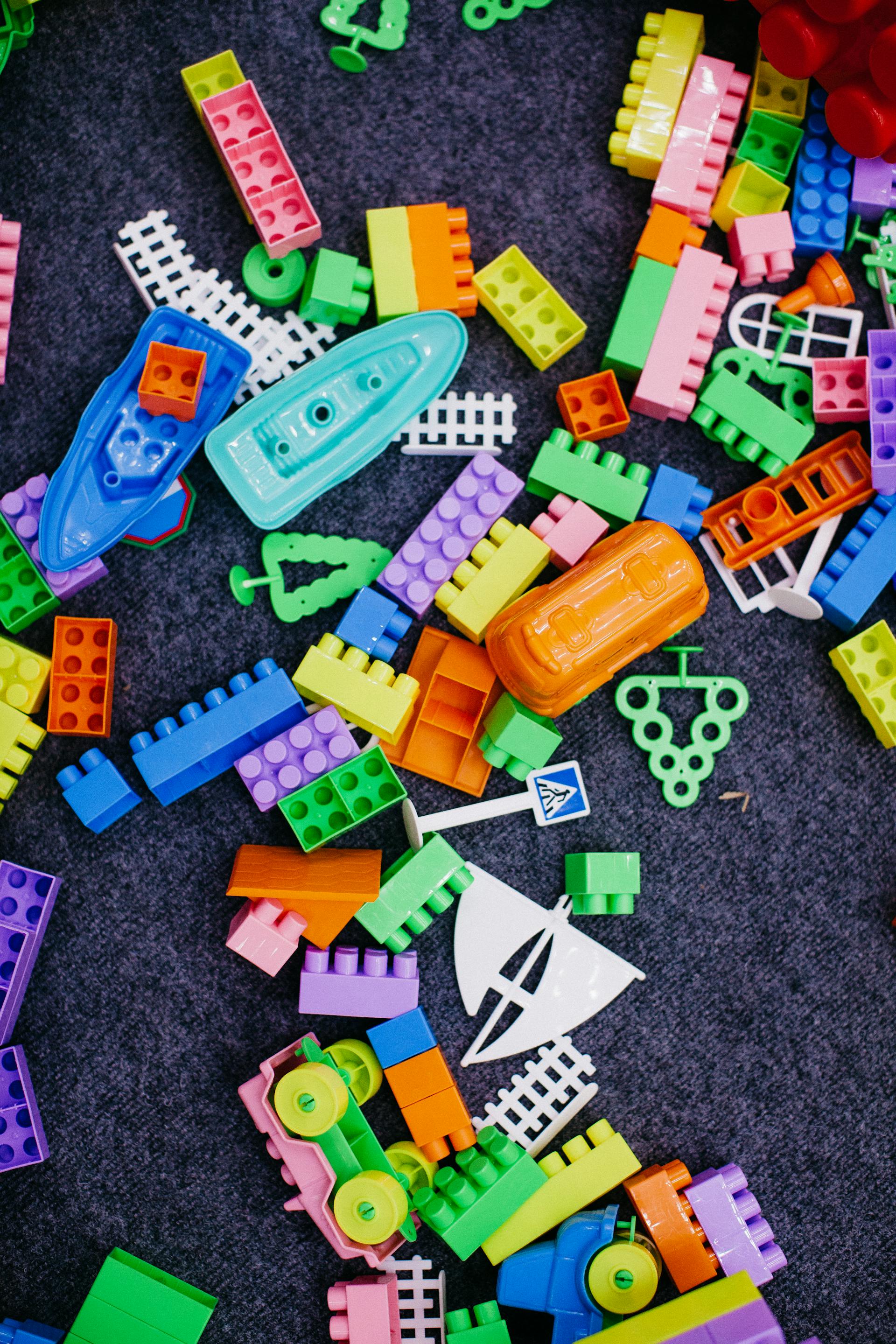
Um close de blocos de brinquedo espalhados pelo chão | Fonte: Pexels
E os armários da cozinha — eu os reorganizava do jeito que eu gostava, mas na manhã seguinte, as coisas estavam de volta aos seus lugares antigos. Era enervante, mas eu continuava dizendo a mim mesmo que era só minha mente pregando peças.
Então, uma noite, notei algo que não conseguia explicar. Eu tinha movido a fotografia de Irene da sala de estar para uma prateleira mais discreta no corredor. Mas quando desci no dia seguinte, lá estava ela, de volta ao seu lugar original.

Uma moldura de foto contendo a foto de uma mulher | Fonte: Midjourney
Foi então que decidi discutir isso com Ben.
“Você está mudando as coisas de lugar pela casa?”, perguntei a ele depois do jantar.
“Não, Brenda, por que eu faria isso?” ele disse. “Eu acho que você está apenas imaginando coisas.”

Um homem rindo para esconder seu desconforto | Fonte: Midjourney
Algumas noites depois, Lucas e eu estávamos trabalhando em um quebra-cabeça no chão da sala de estar. Ele estava focado, colocando as peças com sua pequena língua para fora em concentração, quando de repente olhou para mim, olhos arregalados e sinceros.
“Mamãe disse que você não deve tocar nas coisas dela.”
Meu coração pulou uma batida. “O que você quer dizer, querida?”, perguntei, tentando manter minha voz firme enquanto olhava para o corredor.

Uma mulher atordoada | Fonte: Midjourney
“Mãe de verdade”, ele disse em voz baixa. “Ela não gosta quando você mexe nas coisas dela.”
O jeito que ele olhou para mim era tão sério, como se ele estivesse compartilhando um segredo que não deveria. Forcei um sorriso, assenti e apertei sua mão gentilmente. “Está tudo bem, Lucas. Você não precisa se preocupar. Vamos terminar nosso quebra-cabeça, certo?”
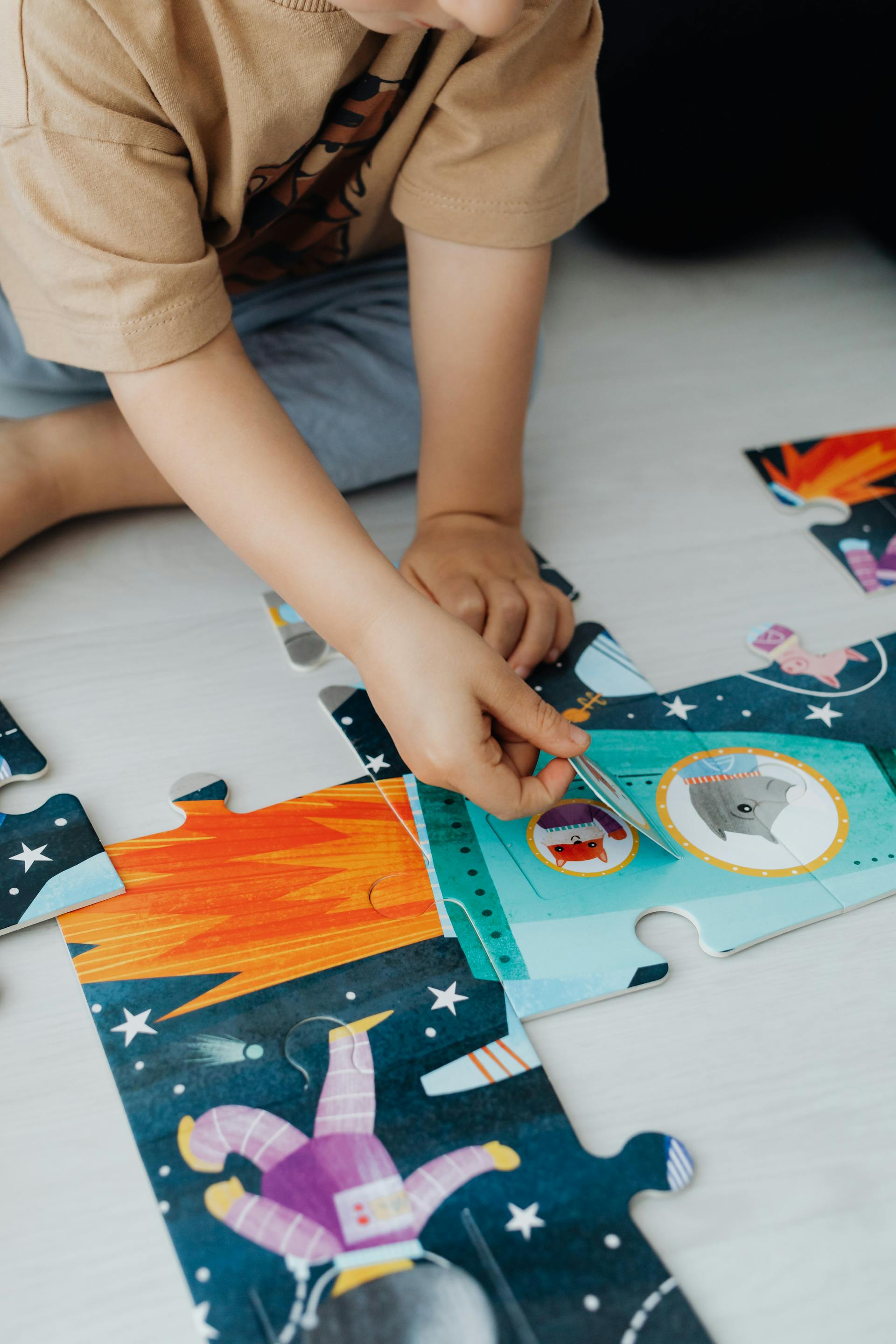
Um close-up de uma criança fazendo um quebra-cabeça | Fonte: Pexels
Mas naquela noite, eu não conseguia dormir. As palavras de Lucas ecoavam na minha mente.
Quando tive certeza de que Ben tinha dormido, levantei-me silenciosamente e fui para o sótão.
Eu sabia que Ben guardava algumas coisas velhas de Irene em uma caixa lá em cima. Talvez se eu pudesse vê-las e descobrir mais sobre ela, isso me ajudaria a entender por que Lucas estava agindo daquele jeito.
Subi as escadas que rangiam, com minha lanterna cortando a escuridão, até encontrar a caixa escondida em um canto.
Tirei a tampa e encontrei fotos antigas, cartas que ela havia escrito para Ben e sua aliança de casamento embrulhada em um lenço de papel.

Uma aliança de casamento embrulhada em um lenço de papel sobre uma velha mesa de madeira | Fonte: Midjourney
Era tudo tão pessoal, e senti uma estranha pontada de culpa ao passar por isso.
Ao desviar o olhar, notei uma pequena porta no canto. Estava parcialmente escondida atrás de uma pilha de caixas.
Eu já tinha ido ao sótão algumas vezes, mas nunca tinha reparado. Lentamente, empurrei as caixas para o lado e girei a maçaneta velha e manchada. Ela fez um clique, abrindo para uma sala estreita, mal iluminada por uma pequena janela.

Uma sala estreita mal iluminada por uma pequena janela em um sótão | Fonte: Midjourney
E ali, sentada em uma cama de solteiro coberta por cobertores, estava uma mulher que reconheci imediatamente pelas fotos.
“Você… você é Emily”, gaguejei. “Você é irmã do Ben, não é?”
A expressão de Emily mudou de surpresa para uma calma assustadora. “Sinto muito. Você não deveria ter descoberto dessa forma.”
“Por que Ben não me contou?”, perguntei. “Por que você está aqui em cima?”

Uma mulher fica estupefata enquanto está em um sótão | Fonte: Midjourney
Ela olhou para baixo, alisando a ponta do cobertor. “Ben não queria que você soubesse. Ele pensou que você iria embora se descobrisse… se me visse assim. Eu… eu estou aqui há três anos.”
“Três anos?” Eu mal conseguia processar. “Você estava se escondendo aqui esse tempo todo?”
“Eu não… saio muito”, ela disse. “Prefiro aqui em cima. Mas às vezes, fico inquieta. E Lucas… eu falo com ele às vezes. Ele é um menino tão doce.”

Uma mulher sentada no sótão e olhando para alguém | Fonte: Midjourney
Um arrepio percorreu meu corpo. “Emily, o que você está dizendo a ele? Ele acha que a mãe dele ainda está aqui. Ele me disse que ela não gosta quando eu movo as coisas.”
“Às vezes, conto histórias para ele”, ela começou. “Sobre a mãe dele. Ele sente falta dela. Acho que o conforta saber que ela ainda está… presente.”
“Mas ele acha que você é ela. Lucas acha que você é a mãe verdadeira dele.”

Uma mulher chocada em um sótão | Fonte: Midjourney
“Talvez seja melhor assim. Talvez o ajude a sentir que ela ainda está aqui.”
Senti minha cabeça girando enquanto recuava para fora do quarto, fechando a porta atrás de mim. Isso estava além de qualquer coisa que eu poderia ter imaginado.
Quando desci, encontrei Ben na sala de estar.
“Ben”, sussurrei, mal me segurando. “Por que você não me contou sobre Emily?”
Ele empalideceu, seus olhos disparando para longe. “Brenda, eu—”

Um homem surpreso olhando para alguém | Fonte: Midjourney
“Você percebe o que ela está fazendo? Lucas acha… ele acha que ela é sua mãe verdadeira!”
O rosto de Ben caiu, e ele afundou no sofá, a cabeça entre as mãos. “Eu não sabia que tinha ficado tão ruim. Eu pensei… eu pensei que mantê-la aqui, fora de vista, seria melhor. Eu não podia deixá-la sozinha. Ela é minha irmã. E depois que Irene faleceu, Emily não era a mesma. Ela se recusou a receber qualquer ajuda.”
Sentei-me ao lado dele, segurando sua mão. “Mas ela está confundindo Lucas, Ben. Ele é apenas uma criança. Ele não entende.”

Uma mulher parecendo gentil e preocupada | Fonte: Midjourney
“Você está certa”, ele assentiu. “Isso não é justo com Lucas — ou com você. Não podemos continuar fingindo que está tudo bem.”
Foi quando sugeri que montasse uma câmera para ver o que Emily estava fazendo. Montamos uma do lado de fora da porta dela naquela noite.
Na noite seguinte, depois que Lucas foi dormir, sentamos em nosso quarto e assistimos à filmagem. Por horas, nada aconteceu. Então, pouco depois da meia-noite, vimos a porta dela ranger ao abrir.

Uma foto em tons de cinza de uma porta de sótão aberta | Fonte: Midjourney
Emily entrou no corredor e olhou para a porta do quarto de Lucas.
Então Lucas apareceu, esfregando os olhos, e andou em direção a ela. Nós a observamos enquanto ela se ajoelhava e sussurrava algo para ele. Então, Lucas assentiu e disse algo de volta.

Um jovem rapaz em pé no seu quarto | Fonte: Midjourney
“Ela está alimentando a imaginação dele, Ben”, eu disse. “Isso não é saudável.”
Ben assistiu à tela, seu rosto tenso e cansado. “Eu sei. Isso foi longe demais. Não podemos mais deixá-la fazer isso com ele.”
Na manhã seguinte, Ben sentou-se com Lucas, explicando tudo em termos simples. Ele lhe contou que sua tia Emily estava doente, que às vezes sua doença a fazia agir de maneiras que confundiam as pessoas, e que sua mãe verdadeira não voltaria.
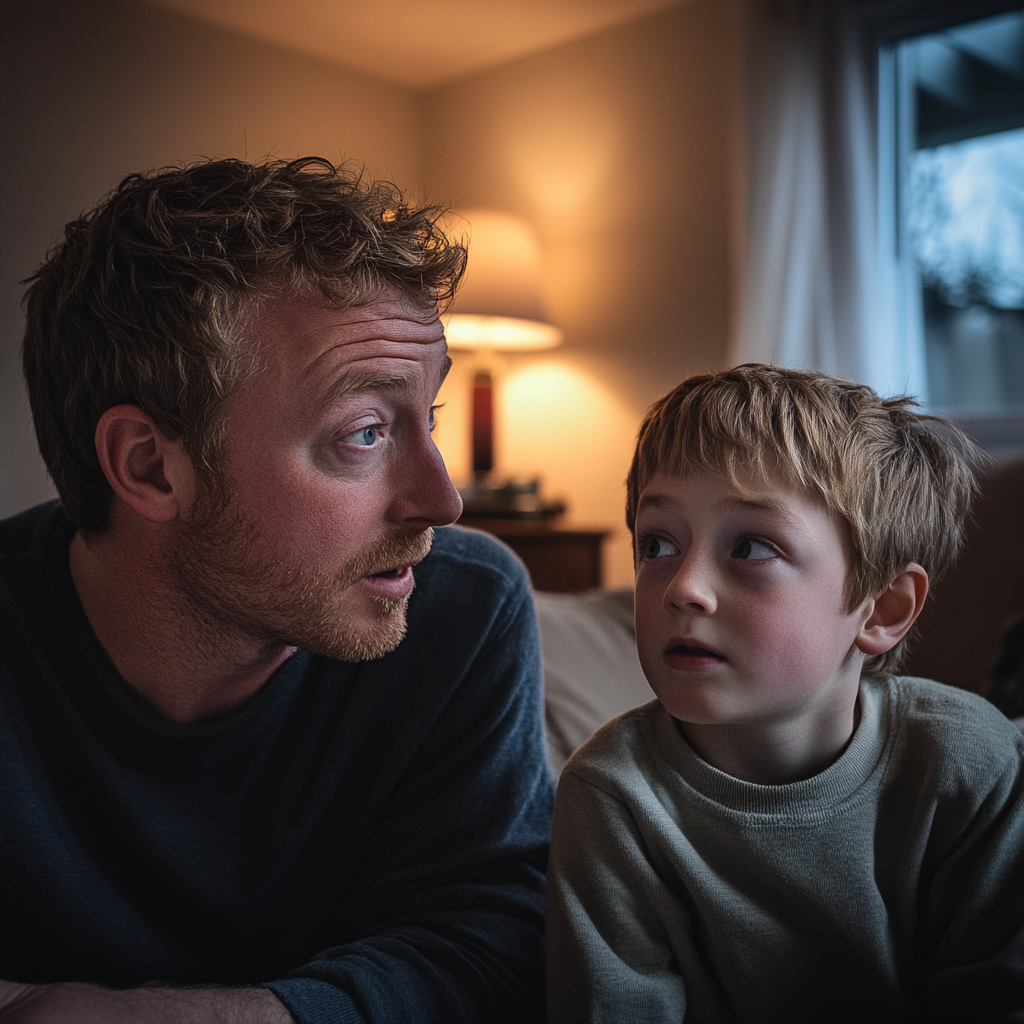
Um pai falando com seu filho pequeno | Fonte: Midjourney
Lucas ficou quieto, olhando para suas mãozinhas, e percebi que ele estava com dificuldade para entender.
Mais tarde naquele dia, Ben providenciou para que Emily fosse ao médico. O processo foi doloroso; ela protestou, até chorou, mas Ben se manteve firme, explicando que ela precisava de ajuda. Depois que ela foi internada no hospital, a casa ficou mais silenciosa, quase mais leve.
Lucas lutou no começo. Ele perguntava sobre Emily, às vezes se perguntando se ela voltaria. Mas, gradualmente, ele começou a entender que o que ele acreditava não era real, e ele começou a fazer as pazes com a verdade.

Um casal feliz | Fonte: Midjourney
Apesar de tudo isso, Ben e eu nos tornamos mais próximos, apoiando um ao outro enquanto ajudávamos Lucas a lidar com a situação.
Nós adotamos uma menina de 4 anos – Um mês depois, ela veio até mim e disse: ‘Mamãe, não confie no papai’
Olhei para o rosto pequeno de Jennifer, observando aqueles olhos grandes e atentos e o sorriso tímido e incerto que ela exibia. Depois de todos aqueles anos de esperança, tentativa e espera, aqui estava ela, nossa filha de 4 anos.

Uma pequena menina feliz | Fonte: Pexels
Richard estava praticamente brilhando. Ele não conseguia parar de olhar para ela.
“Olhe para ela, Marla”, ele sussurrou. “Ela é simplesmente perfeita.”
Dei-lhe um sorriso suave, minha mão descansando no ombro de Jennifer. “Ela realmente é.”

Uma família feliz e sua filha | Fonte: Pexels
Nós percorremos um longo caminho para chegar lá. Foram consultas médicas, longas conversas e papelada sem fim para adoção. Quando finalmente conhecemos Jennifer, eu sabia que ela era a peça que faltava no nosso quebra-cabeça.
Já fazia algumas semanas que adotamos Jen oficialmente, e decidimos que era hora de um pequeno passeio em família. Richard se inclinou para o nível dela, sorrindo calorosamente. “Ei. Que tal irmos tomar um sorvete?”

Um homem conversando com sua filha pequena | Fonte: Freepik
Jennifer olhou para ele, então olhou para mim, como se esperasse minha reação. Ela não respondeu imediatamente, apenas assentiu.
Richard riu baixinho. “Tudo bem, sorvete é isso. Vamos fazer um tratamento especial.”
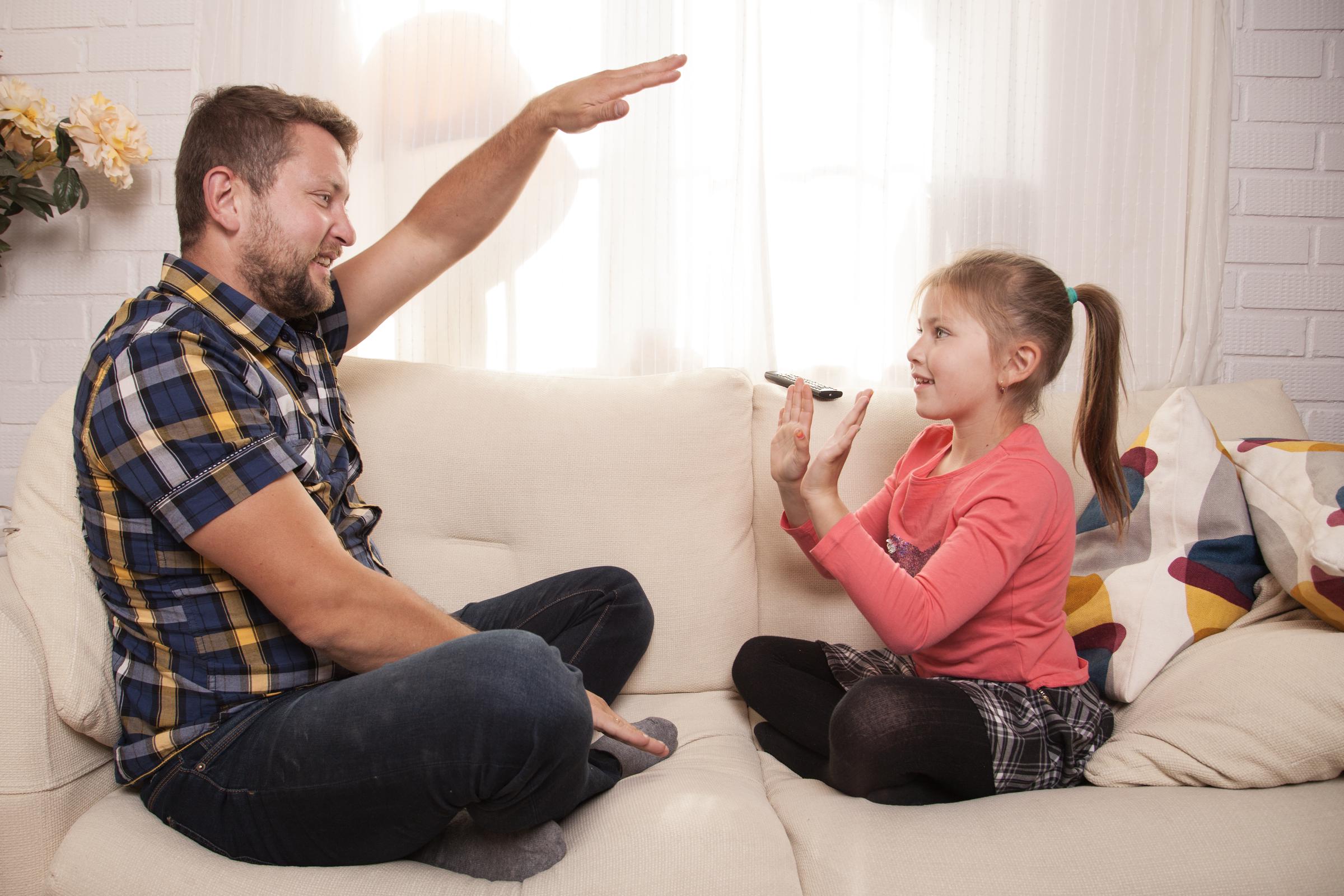
Um homem brincando com sua filha | Fonte: Freepik
Jennifer ficou perto de mim enquanto saíamos. Richard liderou o caminho, olhando para trás de vez em quando e sorrindo esperançoso. Eu o observei tentar persuadi-la a sair, para fazê-la se sentir à vontade. Mas cada vez que ele fazia uma pergunta, o aperto de Jennifer em minha mão ficava um pouco mais forte.
Quando chegamos à sorveteria, Richard foi até o balcão, pronto para pedir para ela. “Que tal chocolate? Ou talvez morango?”, ele perguntou.

Um homem escolhendo sorvete | Fonte: Midjourney
Ela olhou para ele, depois olhou para mim novamente. “Baunilha, por favor.”
“Baunilha, então”, Richard sorriu.
Jennifer parecia contente em deixá-lo pedir, mas notei que ela mal olhou para ele quando nos sentamos. Em vez disso, ela comeu em silêncio, ficando perto de mim. Ela observou Richard com um interesse cauteloso e não falou muito.

Uma jovem séria | Fonte: Pexels
Mais tarde naquela noite, enquanto eu colocava Jennifer na cama, ela ficou agarrada ao meu braço um pouco mais do que eu esperava.
“Mamãe?” ela sussurrou.
“Sim, querida?”
Ela desviou o olhar por um momento, depois voltou a olhar para mim, olhos arregalados e sérios. “Não confie no papai.”

Uma garota séria conversando com sua mãe | Fonte: Midjourney
Eu congelei, meu coração pulou uma batida. “Por que você diria isso, querida?”
“Ele está falando estranho”, ela deu de ombros. “Como se estivesse escondendo alguma coisa. Não consegui descobrir o que, mas tenho certeza de que ele está guardando um segredo.”
Eu não tinha ideia do porquê ela diria isso.
“Jennifer, papai te ama muito”, eu disse a ela. “Ele só está tentando te ajudar a se sentir em casa. Você sabe disso, certo?”

Uma mulher sorrindo para sua filha | Fonte: Midjourney
Ela não respondeu, apenas se enrolou um pouco mais forte sob o cobertor.
Fiquei ali, me perguntando de onde aquilo vinha.
Ela poderia estar apenas nervosa? Talvez se adaptar tenha sido mais difícil para ela do que eu percebi. Mas quando olhei para seu rosto pequeno e sério, um leve desconforto surgiu.
Quando finalmente saí do quarto dela, encontrei Richard esperando na porta.
“Como ela se saiu?”, ele perguntou, com uma expressão esperançosa no rosto.

Um homem sério | Fonte: Pexels
“Ela está dormindo”, respondi suavemente, observando sua expressão.
“Isso é bom”, ele disse. “Eu sei que é tudo novo para ela. Para todos nós. Mas acho que ficaremos bem. Você não acha?”
Eu assenti, mas as palavras de Jennifer ecoaram em minha mente.
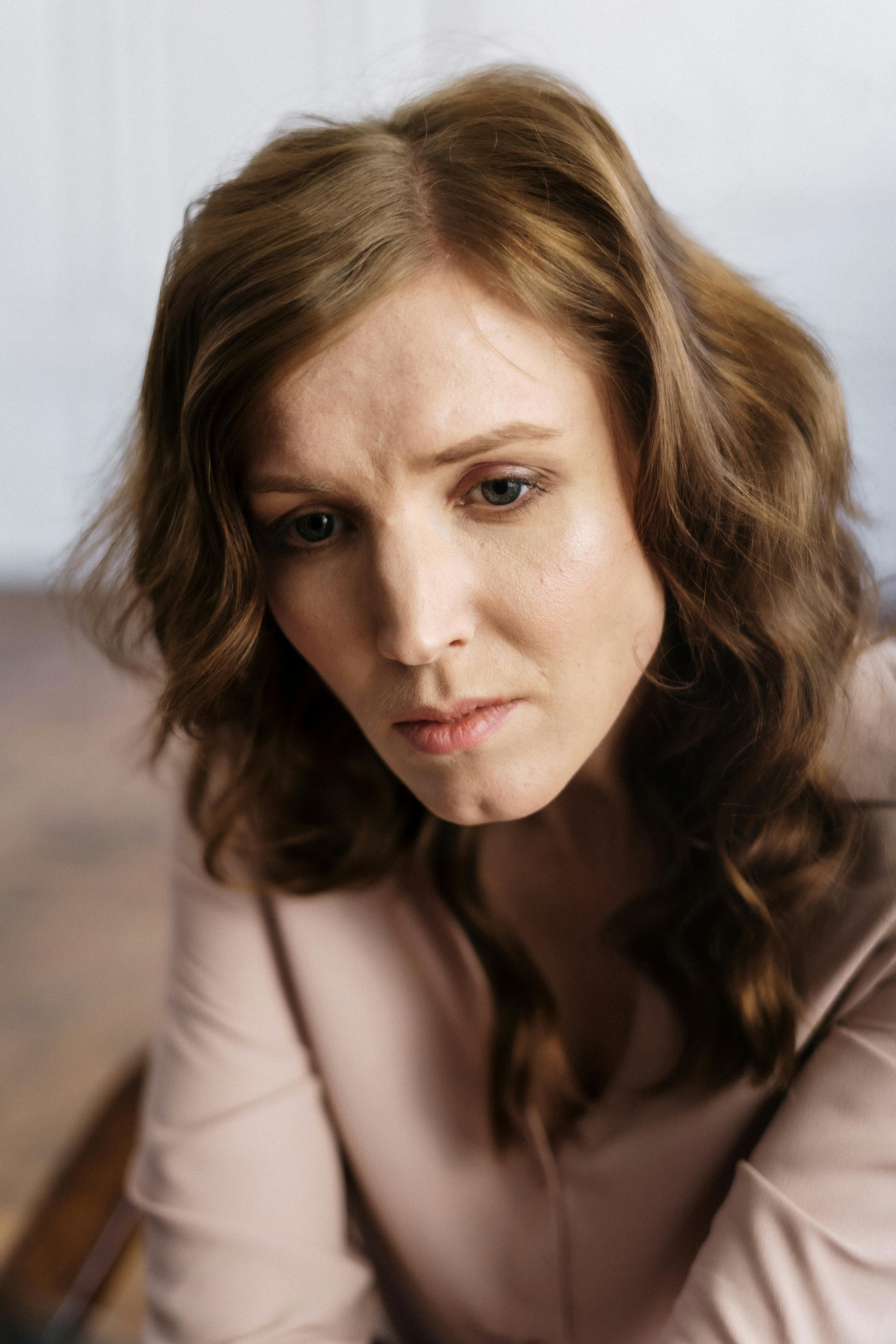
Uma mulher imersa em pensamentos | Fonte: Pexels
No dia seguinte, eu estava cozinhando o almoço quando ouvi a voz de Richard vindo da sala de estar. Ele estava falando ao telefone em um tom baixo.
“Tem sido… mais difícil do que eu esperava”, ele sussurrou. “Ela é… esperta. Jennifer está percebendo mais do que eu pensava que ela perceberia. Tenho medo que ela diga a Maria que sabe que algo está acontecendo.”
Senti meu coração acelerar e minha mente correr para entender o que eu tinha ouvido.
Jennifer pode me contar? Me contar o quê? Tentei me livrar disso, dizendo a mim mesma que devia haver uma explicação. Mas, enquanto eu ouvia, meu pulso só batia mais forte.
“É só que… tão difícil manter as coisas em segredo”, Richard continuou. “Não quero que Marla descubra… não até que esteja pronto.”

Um homem falando ao telefone de costas para a câmera | Fonte: Pexels
O que eu não deveria descobrir?
Eu me esforcei para ouvir o resto da conversa dele, mas não consegui entender nada. Logo, ele encerrou a ligação e começou a andar em direção à cozinha.
“O cheiro aqui é bom”, ele disse, parando atrás de mim.
Forcei um sorriso. “Obrigada. Quase pronto.”

Um homem e sua esposa na cozinha | Fonte: Pexels
Mais tarde naquela noite, depois de colocarmos Jennifer na cama, não consegui mais me segurar. Eu precisava de respostas, então decidi confrontar Richard. Ele estava jogando um jogo no celular na sala de estar.
“Richard”, comecei, “ouvi você falando ao telefone mais cedo.”

Um casal tendo uma conversa séria | Fonte: Pexels
Ele olhou para cima e levantou uma sobrancelha.
“Oh?” ele disse, claramente pego de surpresa. “O que você ouviu?”
“Ouvi você dizer que Jennifer pode… me contar algo. E que é difícil manter as coisas ’em segredo’.” Eu encontrei seu olhar, meu coração batendo forte. “O que você está escondendo de mim?”

Uma mulher triste e séria abraçando os joelhos | Fonte: Pexels
Por um momento, ele apenas me encarou. Então, ele colocou o telefone de lado e se inclinou para frente.
“Marla”, ele disse gentilmente, “não estou escondendo nada de ruim. Eu prometo.”
“Então o que é?” Eu sussurrei. “O que você não quer que Jennifer me diga?”
Richard respirou fundo.

Um homem frustrado | Fonte: Pexels
“Eu não queria que você descobrisse porque… bem, eu estava planejando uma surpresa para o aniversário da Jennifer. Com a ajuda do meu irmão.” Ele revelou. “Eu queria que fosse um grande acontecimento, um primeiro aniversário especial conosco.”
“Uma festa surpresa?” perguntei lentamente.
Ele assentiu. “Eu queria que fosse perfeito para ela. Pensei que poderíamos mostrar a ela o quanto nos importamos. Que ela é parte da nossa família agora.” Ele sorriu, parecendo um pouco aliviado. “Eu sabia que Jennifer poderia dizer algo, e fiquei preocupado que ela estragasse a surpresa.”

Um homem sério falando em seu sofá | Fonte: Midjourney
Fiquei tão aliviada depois de saber o que ele estava fazendo. Ele não era o cara mau que eu quase pensei que fosse.
“Richard”, sussurrei, “sinto muito. Eu só… pensei que havia algo errado.”
Ele riu baixinho. “Ei, está tudo bem. Eu entendo. Nós dois estamos apenas tentando nos ajustar.”
“Eu acho que Jennifer é apenas… protetora”, eu disse, tentando explicar. “Ela não sabe o que esperar, e quando ela me disse para não confiar em você… eu acho que isso simplesmente me pegou.”
“Ela é uma criança sensível. Acho que ela ainda está encontrando seu caminho.” Ele sorriu. “Nós só temos que garantir que ela se sinta segura e amada. Nós três.”

Um casal feliz conversando no sofá | Fonte: Midjourney
Na manhã seguinte, enquanto eu observava Richard gentilmente ajudar Jennifer a escolher seu cereal matinal, senti meu coração se animar um pouco. Ele olhou para ela com tanta paciência, e mesmo que ela mal olhasse para cima, eu podia ver a confiança lentamente crescendo entre eles.
Este trabalho é inspirado em eventos e pessoas reais, mas foi ficcionalizado para fins criativos. Nomes, personagens e detalhes foram alterados para proteger a privacidade e melhorar a narrativa. Qualquer semelhança com pessoas reais, vivas ou mortas, ou eventos reais é mera coincidência e não intencional do autor.
O autor e a editora não fazem nenhuma reivindicação quanto à precisão dos eventos ou à representação dos personagens e não são responsáveis por nenhuma interpretação errônea. Esta história é fornecida “como está”, e quaisquer opiniões expressas são as dos personagens e não refletem as opiniões do autor ou da editora.



Leave a Reply